#thread: personal history lesson
Explore tagged Tumblr posts
Note
do you actually have a ranking or like. rundown of each love interest's particular brand of insanity re: tranquil beloved...? or if that's too big an ask perhaps the highlights.. i am sitting so attentively reading all of the ones you've detailed thus far
in no particular order
zevran: cruel to the end to ask him to have his love’s blood on his hands again, but if he believed it was what they would have wanted, it would be the gentlest, tenderest, of assassinations
morrigan: what power does a templar possess that is beyond her ability to reverse? she will claw the answer from the far corners of the earth and the furthest reaches of the fade before she abandons what is hers
leliana: once, the chantry sunburst was a comfort, a sign of refuge in a world of darkness. now she can only see the one burned into their skin, the wondrous gifts the maker gave to them stolen in the maker’s name, the cruellest game he has played yet. could she keep her faith through such a test? would she even want to?
alistair: there is a hollow in his life that can’t be laughed around. a sick weight in the stomach, remembering flipping his runic token between his fingers in distraction through every chantry lecture where they promised this was necessary. he’s angry. he’s beginning to think he might be a very angry person, really. he’s beginning to think he’s got good reason
fenris: he wonders if, when the lyrium was touched to their forehead, it burned the way his does. he thinks better of asking. there was a time when magic felt like a curse on them both that he couldn’t break. he wants it back
anders: history always repeats itself. there are certain inevitabilities, foregone conclusions, lessons the circle teaches well. you escape, you get caught. you love something, they take it away. you destroy the last thread tethering a mage to humanity—you’re that brutal, that cruel, that stupid—and all you’ll have left is an abomination
merrill: she never understood tranquillity until it was this close; she could never really believe it was possible. it doesn’t matter. her love’s not quite here right now, even as she chatters away to them, but it doesn’t matter. you can fix anything, as long as you’re willing to pay the price
isabela: it’s her own fault, really. her own fault, for taking a chance on someone so targeted, so foolish, so—brave. her own fault for believing them, when they promised she wasn’t going to lose them. she should leave. there’s nothing left for her here. but it’s gotten so hard to run away
sebastian: this changes nothing. his love is as cold as the portraits that line the halls of the palace in starkhaven, as silent and empty as the chantry statues that offer no guidance for what will come. he still kisses their cheek, takes their hand, walks at their side. he is still a husband; he still has his vows, and one more to add to the rest—to find who blackened the maker’s name with this, and teach them what His judgement truly looks like
#these are simply the first thing that comes into my head. also i stuck to the first two games bc i dont know all of those other guys#hope this helps! :)#i am willing to accept other suggestions and scholarship on the subject
511 notes
·
View notes
Note
I'm glad you're back. What would Indra and the Uchiha clan members' reactions be if they had a partner who is a scholar who gives advice on various subjects firmly and capably, and doesn't flinch at anything? Also, she is the only person who can be around them without being overwhelmed by their presence, as her partner was born being completely incapable of feeling fear and pain (I have seen some cases in real life), but she loves the Uchiha's tendency to reproduce and would love to try things from various books, she also likes stimulation enjoying uchiha intensity
This one confused me… quite a bit. There was too much information mixed together, so… I did what I could, I hope it's okay.

Indra
Indra is accustomed to order. To precision. To the steady rhythm of control, unbroken and absolute.
And yet, here she stands. Unmoved, unimpressed, absorbed in her reading as if the world beyond her pages ceases to exist.
-You are watching me again,- she remarks, not bothering to lift her gaze.
Indra remains composed, fingers resting idly against the armrest of his seat. -You are mistaken,- he corrects. -I do not watch—I observe.-
She hums, as if amused. -A delicate distinction.-
He does not respond immediately. Instead, he lets the silence settle, stretching between them like an unspoken challenge. Most would shift beneath the weight of it, keenly aware of what it means when he chooses not to speak. (Y/N), however, merely continues reading, fingers tracing the inked characters with idle ease.
It is almost entertaining.
-You have an unnatural ability,- he muses, rising from his seat with quiet intent. -To remain unshaken in situations where others would falter.-
(Y/N) tilts her head slightly, finally meeting his gaze, unblinking, measured, unhurried. -Or perhaps,- she muses, -I understand more than you assume.-
Indra exhales a quiet laugh. Low, velvety, edged with something just short of indulgence. Not quite humor—no, he does not waste time on such trivialities—but amusement, tempered and sharp.
He steps closer, though the movement is barely perceptible, as if testing the space between them. -Be careful, (Y/N),. he murmurs, voice a silken thread of warning. -There is a fine line between confidence and recklessness...-
She does not waver. -And yet, you have not decided which one I am.-
His silence stretches for a moment longer. Then, the ghost of a smirk, subtle, knowing, devoid of warmth but not without interest.
-Not yet.
And for the first time in a very long time, something stirs beneath the surface.
Madara
Madara is no stranger to control. He commands without question, his authority woven into the very fabric of his being. The world bends around him, people either cower or submit. But not her.
(Y/N) stands before the grand library of the Uchiha compound, meticulously organizing tomes that have gathered dust for decades, entirely unbothered by his looming presence.
-You find entertainment in books rather than war?- he muses, arms crossed as he watches her.
-One must know history to avoid repeating it,- she counters smoothly, her hands never pausing as she sorts the texts. -Besides, you, of all people, should know knowledge is a weapon sharper than any blade.-
His lips twitch, not quite a smile, but something dangerously close. He moves then, fast enough that a lesser person would flinch, would shrink beneath his scrutiny. (Y/N) merely glances up as he closes the space between them.
-You do not flinch.- he observes.
-I have no reason to.- she replies.
Madara chuckles, dark and rich. He expected stubbornness, defiance, but this... this calm, unwavering confidence is something else entirely.
-Perhaps,- he murmurs, his fingers brushing against the spine of an old war manual, -you are a lesson I have yet to learn.-
Izuna
Izuna thrives in reactions. The way people falter under his gaze, the way they stammer when he leans in just enough to be distracting, the way their breath hitches when he murmurs something suggestive, watching their composure unravel thread by thread.
But (Y/N)?
She does not falter.
She meets his flirtation with something worse: amusement.
-You're quite the relentless one, aren't you?- She muses, tilting her head as he leans against the desk where she studies, his smirk unwavering.
-You say that as if it's a bad thing,- he purrs, fingers brushing against the pages of her book, his touch featherlight, teasing. -Tell me, (Y/N), can your books teach you how to handle a man like me?-
Her lips curve into something unreadable, something that sends a shiver down his own spine.
Fuck.
-They can teach me how to dismantle an ego.- She counters sweetly.
Izuna laughs, genuinely, delightedly. Oh, she is dangerous in the best way.
And suddenly, he is the one at risk of being outmaneuvered.
Obito
Obito doesn't know how to handle her.
(Y/N) is smart, too smart. She picks apart every argument he makes, every excuse he comes up with, every defense he tries to throw in her path. She meets him with unwavering confidence, never once backing down, never once giving him the satisfaction of winning their little debates.
-You're impossible,- he groans, throwing himself dramatically onto the couch.
(Y/N) barely glances up from her book. -You're easily overwhelmed.-
-No- He sits up abruptly, glaring. -I just—you're frustrating!-
Her lips quirk upward. -Because I don't let you win?-
Obito sputters. -That's not—!
She closes her book with a decisive snap, leaning toward him just enough to make him hold his breath. -Admit it,- she murmurs, voice light, teasing. -you like it.-
His face erupts into flames. -I- just- stop that!-
And with that, he promptly flees the room.
(Y/N) watches him go.
Too easy.
Shisui
He is used to people getting flustered around him. He knows how to tilt his head just right, how to weave his words like silk, how to break tension with a single well-timed smirk.
But (Y/N)?
She is immune.
-You are entirely too serious,- he teases, leaning against the edge of the table where she scribbles notes.
-And you are entirely too distracting,- she replies without looking up.
His grin widens. -You like the attention, don't you?.-
She finally glances at him then, unbothered, unwavering. -I like a challenge.-
Oh.
Shisui exhales a laugh, rubbing the back of his neck. -You are something else, (Y/N).-
-And you,- she murmurs, returning to her work, -are predictable.-
Damn.
Now he’s the one who needs to step up his game.
Itachi
Itachi watches her the way one might study a complex puzzle, unraveling her intricacies piece by piece. She is not an enigma, not a mystery meant to be solved, she simply is, and that is what fascinates him.
She does not startle at his sudden appearances, does not waver under his gaze. When he speaks, she listens, not out of fear, but out of genuine interest.
-You analyze everything.- she notes one evening, eyes flickering over his expression. -Even now, you're dissecting my words, searching for meaning beyond what is spoken.-
He doesn't deny it.
-And you,- he counters, -believe every answer can be found through logic.-
Her lips twitch, but she does not argue. Instead, she leans back in her chair, studying him as openly as he studies her.
-We are not so different, Itachi.-
And perhaps that is why he finds her so dangerously captivating.
#itachi uchiha x reader#uchiha itachi x reader#itachi x reader#uchiha madara x reader#madara x reader#madara uchiha x reader#obito uchiha x reader#uchiha obito x reader#obito x reader#uchiha shisui x reader#shisui uchiha x reader#shisui x reader#uchiha izuna x reader#izuna uchiha x reader#izuna x reader#indra otsutsuki x reader#otsutsuki indra x reader#indra x reader#naruto shippuden#naruto#naruto imagines#uchiha clan#uchiha izuna#izuna#izuna uchiha#madara uchiha#uchiha madara#madara#otsutsuki indra#indra otsutsuki
111 notes
·
View notes
Text
Good Omens Fan Fiction Friday (6/13/25) - Queer Guardians
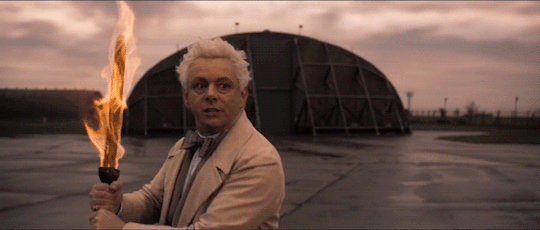
Isn't the Good Omens fandom in itself a protective space for queer people? At its best, yes. But some fics specifically highlight characters who become queer guardians--human (or angelic or demonic) safe spaces for others. Today's theme highlights a few I've read and appreciated.
Let's start with the fic that inspired this week's theme, So Much to be Consoled as to Console (T) by Arokel. In this through-the-ages fic, Aziraphale answers the prayers of queer young people. It happens enough that Crowley speculates that he's become the patron saint of queer kids.
I love this depiction of Aziraphale.
In Guardian Angel: The Hot-line (T) by @itsscottiesstark, a mischievous Crowley sees an ad on the door of a toilet in a pub and assumes it's a sex line. He decides to take the piss out of whoever answers on the other end. Instead, it's a help line. And the person who answers the call is a real angel.
Pages About You; Pages About Me (M) by @dcocca depicts Aziraphale as a bookseller who actually sells books and takes a lot of pride in recommending the perfect choice for a customer. In chapter 22, he makes a big difference in a young man's life by recommending the perfect books. It's a charming moment in a very tender and sweet fic--one of the best I've read.
Vampire Tony feels drawn to Angel Azra for more reasons than his need to feed on angel blood in Partaking of the Divine (T) by @joyandotherstories. In particular, he's smitten by the angel's guardian tendencies. Not only does he provide a safe harbor for the vampire, Azra's bookshop becomes a safe space for queer young people. It's a surprisingly charming story given its sanguinary nature.
In Their Loving Called A Sin No More (E) by ElysiumLeo (The_Nerd_Alert), Heaven assigns Aziraphale to thwart the wiles of demonic influence in Greenwich Village in 1969. At first, the angel wonders if Crowley is causing trouble in response to their fraught meeting in 1967. But he finds much more is at stake. And the ravishing Lady G is on hand to educate Aziraphale and lend support to the queer demonstrations at the Stonewall Inn. Consider this a history lesson with a healthy side of smut.
The Stylings of Madame Glena (T) by @altsernative has Crowley starting a gay bar in the 1970s. It offers a safe space and serves almost as a "front" for the demon to look out for queer young people. His need for an outlet has absolutely nothing to do with a certain angel he hasn't seen since that certain night with a tartan thermos. Then, a mysterious drag queen catches his eye.
This is one of my favorite fics. I'll never tire of finding ways to include it in a theme--The Angel I Knew (M) by @captainblou. How does it fit the "queer guardians" theme? When Aziraphale and Crowley visit the grave of their child who died twenty years earlier, they are accosted by the vicar and Crowley's parents who deny his transition. Retired schoolteacher Tracy (who taught our ineffable pair as well as their parents) sweeps in and delivers the kind of "I'm so disappointed in you" lecture that Crowley's parents would be wise to heed before inviting our couple to her home. Just loved her matter-of-fact vibe; as if caring for her students was not only a vocation but her life.
If you can handle the tags, Survival, Hope and Something More (M) by @raxacoricofallapatoriusrulez tells the story of teenager Aziraphale who ends up living on the streets before he finds sanctuary at a queer youth shelter run by Anathema and Newt and funded by tech mogul Anthony Crowley. This is one of those fics whose tags would normally keep me from reading it but I trust the writer enough to give it a try anyway. I promise you that no matter how bleak it starts, it does fulfill the title's promise. Of course, the Demon and Angel Professors (G) by ghostinthehouse are practically professional queer guardians. It's such a major theme, it runs as a thread throughout the series.
This list is a taste of the many Good Omens fics featuring queer guardians. I'm sure I'm missing plenty of others. Please reblog and share your fave Queer Guardians Good Omens tales. You never know who might need the comfort and inspiration of these stories.
'll be back next Friday with more great Good Omens fan fics on a new theme. In the meantime, check out my other favorite fics on this pinned post of weekly Good Omens fan fiction recommendations. And if my faves appear to be your faves, check out my bookmarks on AO3--all the fics I rate in my top 10% of everything I've read.
Don't forget to nurture the fan fic community. Share kudos and comments to show the many wonderful creators how much we appreciate them.
#good omens#aziraphale#crowley#crowley/aziraphale#aziraphale/crowley#good omens fanfiction#go fan fiction#go fanfic rec#go fan fic recs#go fan fiction recommendations#fan fiction#go fan fic rec
39 notes
·
View notes
Text
was watching another totk video and through that found out what the reward is for completing koltins quests, honestly im not really surprised but also baffled and it really just shows, once again, that totk kinda does exactly what you shouldnt do in a sequel imo.. double down on all the bad stuff of the previous title
at this point i have talked about various problems in detail but i just keep realizing over and over just how much of the wrong lesson they seemed to take from botw, they recycled almost everything from botw by changing some paint or some words, made a giant game even bigger and filled it with boring and tedious busy work that has mediocre to insulting rewards EVEN MORE than botw
game too big and empty? make it TWICE as big, change barely anything about the map of the previous title and the new added map(s) is ONE biom that almost everywhere looks the same and even emptier with little to do
too many krogs? MAKE IT MORE and double down on the literally shit reward bc its the SAME just with one more stack of shit
too many shrines with short puzzles? ADD EVEN MORE and make them even shorter and easier to complete, alot of them not even involving a puzzle and multiple being an utterly out of place tutorial that could have been explained to you in a single text box
rewards in the overworld being mostly either a krog or a shrine which gets repetetive with shrines being ALOT and krogs being wayyy too many? add even MORE shrines and EVEN MORE krogs, but now add over a hundred of caves to it that all get repetetive after just a few of them and you only do them for a shrine or a currency you have to collect to get one cool looking but pretty bad to use armor set and a piece of cloth for your parasail that you can only use one of at the tiem and to switch have to go back to a specific NPC, theres ghost lights to collect which only serve to yet again buy one armor set from a set of NPCs and ar meaningless afterwards, the light roots dont require you to do anything but walk to them and the reward for finding them all is a "you did it" sticker that doesnt even stick (its useless)
weapons break too quickly? well make the weapons you can find even worse to force you to fuse a material to it so its at all usable BUT IT STILL BREAKS and when it does it breaks not JUST the weapon but ALSO a material, materials that you will need for now EVEN MORE EXPENSIVE armor upgrades too, weapons cannot be rewards anymore either bc they will always have to be fused with something to make them stronger bc none is strong on its own- this also applies to THE MASTERSWORD, something ALSO complained about that it still 'breaks' even after empowering it through the DLC in botw, and now it cant even BE empowered (bc no DLC) unless you fuse soemthing to it (to. the. MASTERSWORD.) EVEN THO EMPOWERIGN THE MASTERSWORD IS THE ENTIRE POINT OF ZELDAS ULTIMATELY MEANING- AND CONSEQUENCELESS SACRIFICE !!
the dungeons were to samey and simple? make them look different but keep the core structure (activate terminals in completely seperate from each other "puzzles", fight boss) while also makign them be even more skippable (climable walls, the ceiling jump ability- something the titans DIDNT have) with incredibly easy bossfights that end with an embarassing copy and paste scene that hits you over the head with long known and obvious information over and over
people didnt like how the story was so detached from everything in the present? well, make the story and the present EVEN MORE detached from anything in the present, so far in fact that there is literally no connection to it aside from zelda who is the only connective thread and is also only treated as such (she is as personality lacking as sonia as soon as shes yoinked into the past) and the suddendly and out of nowhere intruduced architecture and history that wasnt a thing in botw but is treated like it was always there
people didnt like how far botw was detached from all other zelda games? ok totk is not only FURTHER detached from those it also completely detached itself from its on predecessor :)
people didnt like the memory system? ok make it WORSE then, its a linear story now that you can ruin by seeing even one out of order, they are super short and dont give you anymore context to anythign than the things you could figure out yourself or were already told really, instead of giving you views into a characters personality you get to view a basic plot summary of a story that is so flavorless and predictable i knew what would happen from the start yet acts like its being vague and cool that i felt like i was beign treated like a literal toddler
too few enemy types? well, we will reuse the old ones EVEN MORE thant before over twice the map and the new ones that are there are either utterlly irrelevant to change up the gameplay or largely feel like the old ones just with a paint job (constructs), the griocks looked cool at first but are just a more annyoing version of the lynels (who feel like an actual duel, akin to a proper boss)
even the things that were adressed, or attempted to, didnt fully work, like the bosses ARE more unique, but also still so incredibly easy and ALSO have multiple duplicats just sitting around in the underground despite them being supposedly the root of the problems of the regions (i like refighting bosses, but id rather have a character that lets me choose ok i wann fight this one again and teleporte me into a vision or sth- also the most fun fights arent even part of it (koga) )
the rain complaint got a new effect type to counteract it, which ... doesnt work well, you need specific materials to make potions with that effect which you also need to upgrade the only armor set wit hthat effect that ONLY works once you upgrade it (i think ... i dont know how high i got it but if even the full upgraded set doesnt negate the rain effect i will not be surprised either lol) also it adds just yet another effect type that spams your inventory and you dont really need .... or i might be the only one that saw no value at all in the "attack up when hot" new type of effects bc it felt so specific and situational while also having a way better option (just make it a standard attack up thing?) at least in my eyes-
... ill stop here .... this got longer again didnt it O-o
#ganondoodles talks#zelda#totk#ganondoodles rants#YET AGAIN#aaaaaaand i wasted all my evening#this was supposed to be a half joking short post#but i keep getting into ranting#hhhhhhhhhhrrrrrrraaaaaAAAAAAAAAAAAAAAAAAAAA
225 notes
·
View notes
Text
IBO reference notes on . . . queerness
How has it taken me this long to write about this aspect of the show? (He asked rhetorically, staring at the enormous amount of fanfic that basically stands as a thesis statement on how very queer this part of the Gundam franchise is [as opposed to all the other terribly straight parts, he added, sarcastically].)
Anyway, let's do it. Full spoilers up to the end of the show will follow, together with discussion of child abuse and exploitation, since that is what IBO is all about.
Special thanks to @lilenui and @prezaki for their invaluable assistance in locating sources.
Statement of caveats: this work is an amateur analysis of the English-language localisations (subtitled and dubbed) of a piece of Japanese media. I do not speak or read Japanese. I am myself bi, which qualifies me to be attracted to more of the cast than the average viewer, and have a working knowledge of LGBTQ+ history in the UK and USA, which tells me nothing about the cultural and historical context in which this anime was made. As such, I will not be addressing the behind-the-scenes production or the corporate mandates surrounding it but will focus narrowly on what I perceive to be present in the text (hereafter meaning both the script and animation, and any additional fictional details provided elsewhere).
Queerness in Gundam
Some background before we dive in. To my knowledge, the first character in the Gundam franchise to be intentionally depicted as LGBTQ+ is Guin Sard Lineford from Turn A Gundam (1999). An ambitious young aristocrat who spends the series on the line between hero and villain, he is infatuated with protagonist Loran Cehack and the show makes little attempt to play this as anything other than one man falling in love with another.
This is entirely one-sided and not appreciated on Loran's part, although that seems to have less to do with it being homosexual attraction than with Guin's high-handed and entitled attitude to life, filtered through heavily gendered social norms. For plot reasons, Loran spends several episodes cross-dressing as 'Laura Rolla', corsets and all, and Guin continues referring to him as 'Laura' long after the deception is no longer required, saying it 'suits him better'. Guin is eventually called out on this by a third character, who accuses him of forcing an idea of feminity on the other man rather than stoop to place himself in the position of a 'wife'. Objectifying Loran is presented as of a piece with Guin's overall flaws as a person, to whit, putting his own views about how things should be above the material reality and desires of those around him.
Guin is also the only explicitly gay character in the show (I'm honestly not sure how to classify whatever Dianna Soreil and Kihel Heim have going on, but it's certainly not labelled in the text). Therefore no counterpoint is provided to demonstrate healthy queer relationships. I don't state this to dismiss his inclusion: he forms part of a smart, nuanced plot thread, and Gundam creator Yoshiyuki Tomino had to fight to get Guin's homosexuality clearly included. But even so, Guin is a palpable step forward rather than a watershed moment, and the end result veers close to some nasty stereotypes about queer people imposing their desires on others.
There are other examples of characters transgressing gender norms in Turn A, most especially Loran's aforementioned cross-dressing. He is comfortable playing the part of 'Laura', in ways that mitigate viewing this situation as the extended joke it might be in another production. Funny moments do come up – particularly in the lead-in to his 'debut' as he acclimatises to the female attire of the show's pseudo-Edwardian setting and takes posture lesson – but he and the concept of a man in ladies' clothes are never made a subject of mockery. The same cannot be said for the character of Sochie Heim, whose attempts as a young woman to fulfil a gung-ho masculine role often turn comedic. This is part and parcel of her assaying militaristic modes of action, which are soundly mocked across the board. It nevertheless stands out next to Loran/Laura.
Further, Loran's status as a literal moon-child carries implications for his attitudes. His dismissal of existing social standards on Earth is very much presented as correct, and in keeping with what I know of Tomino's other writing and stated beliefs, but it dovetails unfortunately with a treatment of queerness as otherworldly, not something that may be found among an average population. We get another example of cross-dressing in the next-but-one series, Gundam 00 (2007, not a work Tomino helmed), where the usually male-presenting artificial lifeform Tieria Erde switches to a female presentation (in a ball-gown, no less) during a covert mission. This sufficiently parallels Loran's case, I assume it was a deliberate call-back, being as it is a disguise enacted by someone even less typical than a boy from the moon.
What I am driving at is that while Guin, Loran and Tieria may be characters who are queer or perform queerness in some manner, they do not necessarily represent an outright embracing of queerness as a mundane facet of everyday life.
Fast-forward to 2024 and the latest mainline Gundam show is a lesbian romance.
If you have been following my blog for a while, you will know I do not hold The Witch From Mercury in especially high regard. I think it is annoyingly messy, frequently half-baked, and, broadly-speaking, exactly as frustrating as I'd expect from the guy who wrote Code:Geass. It's still an explicit love story that opens with a clangingly blunt statement about the acceptance same-sex relationships and ends with the two female leads happily married to one other. For all its flaws, I genuinely think the central relationship between Suletta Mercury and Miorine Rembran is a nice piece of story-telling, not to mention admirably open about what it is doing. Like it or lump it, Gundam is gay now, properly, with a protagonist and co-protagonist who can be definitively labelled queer and whose romance appears entirely unremarkable for the setting (in terms of being same-sex; clearly there is a lot to remark upon otherwise).
I would be remiss if I did not mention that the conclusion of the series was accompanied by a certain amount of corporate arse-showing, with hollow attempts to walk back the ending seemingly for the sake of appeasing homophobic elements within and without the companies that produce Gundam. The frankly laughable nature of these actions stands testament to how unequivocal G-Witch is. It is flatly impossible in my opinion to interpret as anything other than flagrantly homosexual, and that's great.
Between this interesting but limited start and the full-throated present lies Iron-Blooded Orphans (2015), my absolute favourite and the show that got me writing slash fic after years of… not doing that. So: what is the deal with queerness in IBO?
Natural for a human
By my count, including all present spin-offs, there are three characters stated in-text as being attracted to people of the same gender (Yamagi Gilmerton, Iznario Fareed, Deira Nadira), two who are at the least open to the idea (Norba Shino, Mina Zalmfort), two whose mutual attraction is stated within the context of polyamory with a third person of the opposite gender (Atra Mixta, Kudelia Aina Bernstein), one whose sexuality is briefly hinted at (Chad Chaden), and one male character who is possibly not attracted to women (Orga Itsuka).
Let's get Iznario out of the way first, because the less time we spend on the actual paedophile, the better.
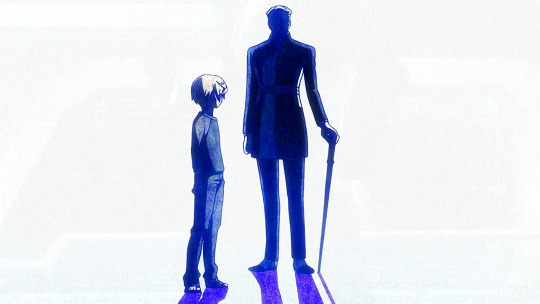
Lord Iznario Fareed is a rich, powerful aristocrat who sexually abuses young blonde boys and inadvertently sets large parts of the plot in motion as part of quasi-villain McGillis' backstory. In a lesser show, Iznario would be the embodiment of the 'predatory queer' stereotype Guin skirts the edge of. Here, however, he is very much not the only 'gay' character present and his proclivities demonstrate one of the many ways the world exploits vulnerable children, a core theme of the series. Early on, we see fleeting glimpses of young girls being pimped out on the streets of Mars. Iznario shows this social failing extends to the much richer Earth and although he is portrayed as the worst among the Gjallarhorn elite, they all abuse their power for personal gain. Thus, as much as the reveal of what he has done carries a certain shock value, it is not present purely for cheap impact. (This isn't the essay to discuss it, but the flashbacks to McGillis being abused as a child are a masterclass in how to frame such things around the victim, clearly communicating what's happening while avoiding gross voyeurism.)
I don't know how deliberate it is the canonical gay character who is shown in an entirely positive light fits the profile of Iznario's victims to a T, but it does underscore we're looking at a case of power allowing people to get away with hideous things, not a stand-in for queerness in general. To an extent I resent having to spell this out, since it seems so obvious Iznario is not fulfilling the role of a homophobic cliché. Sadly, the cliché exists and the point is worth discussion.
Moving swiftly on: Yamagi and Shino.
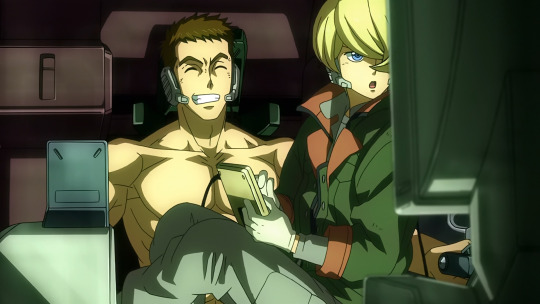
Yamagi Gilmerton is a small, quiet teenage boy with a somewhat withdrawn and acerbic personality, who spends much of Iron-Blooded Orphans nursing a hopeless crush on mobile suit pilot Norba Shino. Like the majority of the cast, Yamagi is a child soldier, but a mechanic rather than a combatant. Additional backstory commentary reveals that he struggled on joining CGS mercenary group due to his physique. Indeed, while this detail is not directly referenced in the anime itself, he is indeed drawn noticeably thinner than the other boys.
Again, we veer towards stereotypes, where a queer character is portrayed as weaker and more effeminate. Yet in spite of leaning this way in looks, Yamagi is an eminently capable person, never treated as lesser for fulfilling a support role rather than being a fighter. If anything, IBO goes out of its way to highlight how vital good mechanics are to mechanised warfare, and we see multiple examples of Yamagi being both assertive and kind of badass. At one point, he scales, unaided, an 18 metre tall mobile suit that's collapsed to its knees. When he and Shino are revisited in spin-off game Urdr Hunt (soon to be some form of animated production), he pilots a spaceship within an active battle-zone, flying escort for a damaged freighter as it retreats. In Season 2, he's comfortable ordering Tekkadan's new recruits around and is the first person to properly chew Orga out for his failings as a leader. Far from being an outlier among the protagonists, Yamagi is equally brave and dedicated to the cause, irrespective of his sexuality.
To be fair, he does tend to clam up and grow more awkward around the object of his affections. To be equally fair, he has the misfortune of having fallen for the most oblivious himbo on God's red Mars.
Shino is a big, boisterous warrior, the polar opposite of Yamagi in personality and physicality. He embodies Tekkadan's machismo, eagerly anticipating the chance to prove their strength and generally being a standard bearer for becoming the biggest, baddest group around. Things are not as straightforward as they seem on the surface, however. He shows a good awareness of when the group is in over their heads – going so far as to suggest retreat in the face of bad odds several times – and he is not nearly as sure of himself as he might first appear. He displays a wide streak of insecurity about his abilities as a soldier, reacting badly to people questioning his dedication or competency. And he crumbles completely when some of his comrades are killed as the result of a split-second mistake on his part, stating a wish to have died in their place. Thereafter, he acts in ways that read as choosing to take all the risks on himself rather than go through more loss. It makes him an interesting mix, someone who acts as a cheerleader, boosting everyone else's morale, while swallowing his own doubts and personal fatalism.
He is also presented as one of the most sexually active members of Tekkadan, using his wages to visit brothels to sleep with women. Indeed, he is frequently found extolling the virtues of the opposite sex, referencing collections of pornography (at least in the English dub), and generally being a very typical teenage boy about such matters.
Given this, you might assume Yamagi is longing hopelessly for a straight man. That is indeed the idea the show teases us with for much of its run (can something be straight-baiting? I feel if anything ever earned that title, it's this). OK, Shino's fond of Yamagi as a friend and frequently relies on his assistance in improving his fighting ability, and per ancillary material, is the one who got Yamagi transferred to the mechanics corps in the first place, rescuing him from struggling in the infantry. And sure, Shino spends an awful lot of time in very close proximity to Yamagi, including literally pulling him into the cockpit to assist with a mission. And yes, Shino is absolutely a flamboyant creature, sporting gold ear studs and an attraction to the colour pink, ensuring his mobile suits are painted all over magenta in order to stand out on the battlefield. And certainly, Shino is extremely empathetic, adjusting his attitude depending on his impressions of other people, such that he dials his boisterousness down in Yamagi's presence, displaying a far more gentle affection than he does with his other friends.
But clearly he hasn't noticed Yamagi is head over heels for him.
Right?
Well, towards the end of Season 2, during another moment where Yamagi is literally sitting on Shino's knee, Shino proposes the two of them drink together all night long once the fighting is over. Not only is this an unambiguously romantic overture (he's asking while pushing aside the fringe that normally covers half of Yamagi's face, in order to look into his eyes properly), it comes after a joke several episodes earlier in which Shino has to explain to a less worldly comrade that a girl inviting you for a drink is not a request to go out with the whole gang but a far more intimate gesture (I say explain, it's more expressing incredulity Akihiro didn't realise Lafter was asking him on a date). Later, it is revealed Shino did indeed work out that Yamagi 'likes' him (to his friend Eugene's exasperation that it took him so long to notice), and he reacted with amazed delight to discover there was someone in Tekkadan who'd fall in love with 'a guy like me'.

He'd assumed because Tekkadan is a family (a description provided by their ally Naze, which everyone just kind of runs with), romantic love wasn't possible between them. Having worked through this mental block and finally realised the blindingly obvious, he renews his desire to protect Tekkadan as long as he lives, refuting his previous view of himself as an expendable human shield and heading out with every intention of surviving all the way to the end.
And because IBO is an exquisitely-written tragedy, he is promptly killed while attempting a futile one-man attack against their enemies, his advances on Yamagi forming part of a long build-up whereby the boy who loves him provides the tools he needs to charge into a suicide run.
Right then. *drags out the reading comprehension soap-box* I have seen some people refer to this as an example of the 'bury your gays' trope, and there is nothing more likely to get me manifesting behind you in the form of an irate shoebill than to do likewise. 'Bury your gays' refers to a tendency for queer characters in fiction to disproportionately suffer tragic fates. This is a writing choice usually rooted in the idea queer relationships are inherently tragic, either because they are viewed as a perversion of 'correct' forms of love, or because of some misguided idea the prevalence of homophobia means queer joy is impossible. I am going to be charitable and concede this is indeed a case where one half of a budding homosexual relationship dies horribly. But, as always, the context matters.
All but one of the romantic relationships established prior to the epilogue of Iron-Blooded Orphans end in death. Of the two that survive in some capacity, one is a heterosexual background romance between two older characters and the other is a pair of women I shall be covering later. IBO is a story about child soldiers that does not shy away from the fact these are teenagers being fed into a meat-grinder. That the director's original intention of killing every named character was toned down (to the series immeasurable benefit, in my opinion) dos not change a narrative arc towards doom.
Within this, Yamagi and Shino aren't singled out for being queer. The coyness around Shino's eventually-evident bisexuality serves to generate an instant of hope and relief right before the rug is pulled from under everyone's feet. Where Shino's death does differ from those of other characters is in presentation: he dies alone and does not get any form of farewell or the passing-on moment afforded to others. But that is only to be expected, since we're talking about the point where it becomes clear there is no saving the situation. It's a cruel, abrupt moment of bad luck, puncturing the heroic idea of scraping victory at the last second. Shino flew out intending to live and he died anyway. A queer relationship forming part of what he was fighting for is an almost incidental detail.
(As an aside, I am aware of two other examples in Gundam fiction where a pilot and a mechanic have a doomed love affair. One is in Char's Counterattack, where a male engineer's romance with a female pilot ends with them both being abruptly killed, and the other is from Gundam AGE, where a female mechanic sacrifices herself for the greater good, leaving a male pilot to mourn her loss for the rest of the series. Shino and Yamagi reiterate this same concept.)
Stepping back from the tragedy, Yamagi's love for Shino is as delightfully underplayed as the other relationships in the show, with little emotional melodrama being wrung from the romance itself. Yamagi can't bring himself to declare his feelings, frequently turning cold instead and perpetuating Shino's misunderstanding of where they stand. Yet Shino ultimately proves enthusiastic for the idea, rendering moot any concerns Yamagi had over getting turned down (going beyond the text, a Q&A with the series' director confirmed Shino was written as bi). Equally, in the aftermath of Shino's death, Eugene comforts Yamagi by relating the truth of Shino's earlier realisation and even going so far as to rebuff Yamagi for implying there's something wrong with him for grieving. This and other interactions in the same episode imply those nearest to the pair were well aware of Yamagi's desires and had absolutely no problem with them. The prevailing attitude within Tekkadan is one of complete acceptance for its members and this is no different.
Indeed, for me, the most important part of how queerness is represented in IBO is that it is treated as just another aspect of the diversity of the cast. I've seen it stated that viewing homosexuality as a natural part of human existence was Tomino's motivation in making Guin gay. IBO presents us with the same idea, far more seamlessly and far more positively.
Now, let's leave the anime proper and look at the same-sex pairing from spin-off manga Iron-Blooded Orphans: Moon Steel.

Deira Nadira and Mina Zalmfort are part of the Gjallarhorn nobility and their marriage was arranged to strengthen relations between their two families. We see an example of a similar political match in the main show, where the heir to the Fareed family, McGillis, is betrothed to the second child of the Bauduins, the much, much younger Almiria. That this can take place regardless of the gender of the participants has big implications for the functioning of a bloodline-focused aristocracy. Presumably it indicates they are happy to use medical technology to ensure the Nadira family continues into the next generation, and if same-sex marriages are thus permitted, that means fewer factors to worry about when it comes to perpetuation. Whether male-male weddings are allowed too remains an open question; given the existence of real-world double-standards, it is possible Deira and Mina represent the only acceptable form of homosexuality. Nevertheless, that it is accepted speaks volumes. Gjallarhorn is not an especially progressive organisation, built as it is on rigid class structures and notions of human purity. Yet here we are.
Perhaps we should have expected that the norms around gender in this system don't correspond to strictly patriarchal patterns from the real world. Carta Issue, a key player in Season 1 of the anime, is the only child of the Issue Family's current leader and positioned as his sole heir, irrespective of the fact she's a woman. The logical inference is that any children of hers would count as Issues, rather than belonging to a potential husband's family. Deira is similarly the heir to her father's position, although intriguingly, it's not outright confirmed if she is his only child or simply the oldest. The possibility exists that gender is a non-factor in determining inheritance.
With respect to sexuality, Deira seems pretty obviously intended to be a lesbian. Her relationship with Mina is presented as one they are both happy with, despite it being an arranged by their parents, and Deira is depicted in the manual for Gundam Gremory's model kit as favouring the clothes of 'a handsome man'. She doesn't present that way within the manga' story, first showing up wearing the standard unisex Gjallarhorn pilot-suit, then wearing a formal gown for a meeting while in an official capacity. But she is depicted wearing masculine clothes in silhouette when initially mentioned and in a post-story panel at the back of the final volume.
(Another aside: the fan translations I use for this part of the manga refer to Deira using male pronouns when she's introduced. However, that could simply be down to the poor quality of said translation; she's consistently referred to using female pronouns in official materials and the game adaptation of this scene has her named as simply 'Lord Nadira', the standard appellation for Gjallarhorn family heads.)
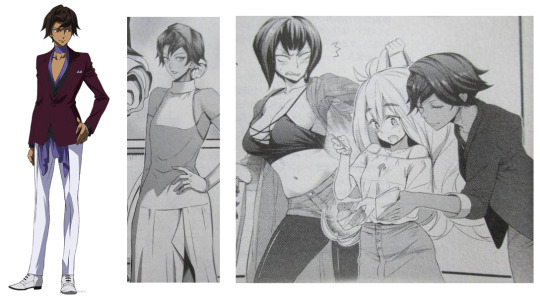
Whether Deira's code-switching is the result of institutional expectations around her role or personal preference, it adds extra texture to her depiction. While civilian garb was designed for the adult version of Carta and closely matches conservative gender expectations for a woman, she's never shown wearing it, so we don't have a point of comparison to judge what's required of a character in Deira's position.
Regarding Mina, you'll notice I grouped her with Shino rather than the characters whose sexuality I consider to be stated outright. With Shino, the nature of his sexuality is not put absolutely beyond question in the text. This is splitting hairs due to the overt nature of what's on screen but the fact remains, the anime doesn't clarify if his being open to Yamagi's love means he already thinks of himself as bisexual, or if this is something he hadn't considered before. With Mina, it's more a case that I'm unwilling to label her one way or the other based on the available information. Deira carries sufficient signifiers, I find little room for doubt over the intention. We also have an outright statement that she holds great affection for Mina regardless of being obliged to consider her an eventual romantic partner. Indeed, she becomes so upset by believing her fiance dead, she runs off to Antarctica in a Gundam. But the exact depth of Mina's feelings in return is not discussed.
In addition, Mina is considerably younger than Deira. McGillis and Almiria's match takes place when he is (probably) somewhere in his late twenties and she is nine, with plans for the union made four years prior. This is not great, to put it mildly, albeit fairly typical of how such things have historically worked for nobility. Based on appearances and how they are treated by the rest of the cast, I would assume Mina to be in her mid-teens, and Deira to be in her early twenties (annoyingly, exact ages are provided for several characters in Moon Steel, just not these two). A less dramatic gap (and I don't believe Mina is meant to be quite as young as her appearance perhaps suggests), yet still significant when one of the people involved is below what we'd consider adulthood.
There is no indication of anything untoward going on, within the confines of the situation, similar to how we're given no indication McGillis is abusive towards Almiria. Any comparisons with Lord Iznario's activities lie purely along the axis of how children are exploited by adults even without suffering directly. All indications are that Deira and Mina have made the most of something they have little choice in. Regardless, I still feel more comfortable describing Mina as open to being in a relationship with another woman, rather than pinning her to a specific preference.
Continuing the theme of things where doubt or ambiguity exist, let's discuss some characters were there shouldn't be any: Atra and Kudelia.
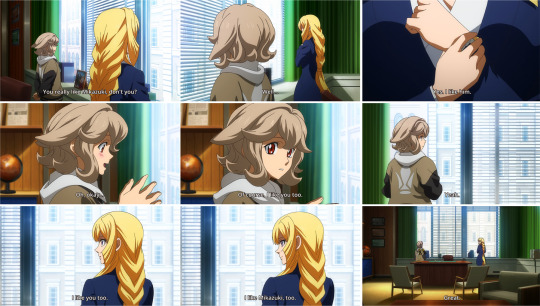
I don't know about you, but I find it extraordinarily hard to read this as anything other than a three-way love-confession. Still, in the interests of fair play, let's review the wriggle room for declaring this something else.
Kudelia Aina Bernstein and Atra Mixta are love interests of nominal protagonist Mikazuki Augus, in an iteration of another tried-and-true trope, that of a male lead inexplicably being attractive to the female characters in his orbit. Or rather, it would be if the show didn't take such pains to demonstrate why these girls fall for him, setting up a long-established crush on Atra's part (rooted in him being the first person in the world to be nice to her) and a mutual respect on Kudelia's that gets spurred to more when Mikazuki randomly decides to kiss her because she 'looked cute' (Mikazuki has the manners of a feral stray raised on the streets, because that's precisely what he is).
Justification aside, this has the makings of a traditional triangle, that is, one without a connecting base, which we might expect to be resolved by either Kudelia or Atra 'losing out'. For a few episodes, this does indeed seem where we are headed. Then Atra discovers the concept of polyamory via the polygamous Turbines group and all bets are off.

Having realised it is perfectly possible for a family to consist of multiple romantic partners, Atra proceeds to work towards ensuring everyone gets everything they want. Strictly speaking, this doesn't mean she is attracted to Kudelia as well – even if she clearly recognises Kudelia as an attractive person from the start and…
You know what? Acknowledging that the information about their eventual marital status was only stated in interviews at live events with no official record and seems to have been framed around raising the son Atra has with Mika, I'm going to abandon the pretence of both-sided objectivity and go straight for the throat. Turns out my patience for soft-footing this lasts about as long as it takes to say 'bi-erasure'.
Over the course of Season 1, Atra not only decides the end-game is some form of three-person wedding, she also:
Shows no jealousy over Mikazuki and instead chides him for not providing the correct emotional support to the girl he kissed.
Spends a great deal of time with Kudelia and enthusiastically throws herself into furthering Kudelia's goals, without necessarily understanding the technicalities.
Covers for Kudelia by pretending to be her during a confrontation with Gjallarhorn soldiers, getting herself soundly beaten up in order to prevent them from chasing after the real deal.
Drives an armoured car through a battlefield for Kudelia's sake, safely delivering her to a vital rendezvous.
Leaps in front of a massive mobile suit to push Kudelia out of its path, physically shielding the other girl with her body.
As much as it pains me to resort to the 'if this were a man and a woman, would it read as romantic' crudity – yes! Yes it would! Especially since in Season 2, Atra presents Kudelia with a good-luck charm bracelet she has woven, something she previously did for Mikazuki explicitly out of having a crush on him. I'm all for embracing platonic love (which is why Takaki and Aston are not featuring in this rundown) and there's nothing in the above list necessarily entailing attraction beyond deep friendship. But when Atra consciously repeats her actions towards Mikazuki (someone she goes on to definitely have sex with) with Kudelia and it leads to the scene between them where they declare how they feel about each other and Mikauki, looking for non-romantic angles takes more effort.
After all, if we are to read Shino's openness to Yamagi's affection from the things he says and how he looks saying them, we can certainly do the same for Atra and Kudelia's use of the word 'like' in reference to one another and their reactions to hearing it said of them. (Obligatory note that if there is some nuance in the original Japanese the translation doesn't capture, I'd love to hear about it. The English scripts, however, leave little to the imagination.)
It is indisputable that Atra feels a strong affection towards Kudelia and while I have been focusing on her a lot (she is by far the most proactive member of the triad), Kudelia reciprocates at every opportunity she is presented with. Even if there truly wasn't an intention to portray this as exactly equivalent to Atra and Mikazuki, the end result manages to be on par with Yamagi and Shino. Consider Kudelia and Mikazuki, for example. In terms of portrayal and the two-girls-one-guy trope being explored here, they have the same level of chemistry and the same absence of overt consummation as Kudelia and Atra, and it would hardly be a serious position to claim the show does not place the two of them in romantic conjunction, now would it?
You may at this point be wondering why I am getting so defensive of reading Kudelia and Atra as romantic partners. Honestly, I am too. On reflection, I think it's because IBO is playing around with such a worn-out and insipid means of wringing drama from characters who should know better, I keep searching for the catch. And yet there isn't one. This show really did respond to a nascent love chevron by having the mousy, homely girl tell the governor's beautiful daughter to shut up and get in the polycule, and turned it into a true triangle.
That's wonderful. I cannot properly express the wave of joy and relief that came over me when I realised this was the direction they were taking. It ends in tragedy, of course, Mikazuki giving up any chance of a peaceful life to die in battle, far away from the women who love him. But their lives continue because of his sacrifice and by all appearances they remain together. In some ways, for the overarching message of hope persisting on the back of heartbreak, the precise details of that arrangement don't particularly matter. So why not take the gayest reading possible?
What an excellent segue into a blink-and-you'll-miss-it, probably-stretching-too-far, nonetheless-compelling potential bit of queerness: Chad in the series epilogue.

One of the many tertiary characters in Tekkadan, Chad Chaden has minor speaking parts throughout Season 1 and a larger role in Season 2. He initially appears during a particularly dire early moment when it looks like everyone is about to be killed by attacking mobile suits. His obvious resignation to this fate sets the tone for a rather dour personality, at least while on the clock. Chad starts out as human debris, a person enslaved after a space battle and sold to the CGS military group as free labour. This gives him a very matter-of-fact attitude towards fighting and the kill-or-be-killed nature of being forced into it – he voices the sentiment that even when facing other human debris, they can't afford to show mercy.
Off the clock, Chad displays a more sensitive personality. He seems studious, learning about interplanetary communications from Kudelia's maid Fumitan and later being promoted to leader of Tekkadan's Earth branch. He has some difficulty acclimatising to being treated as a free person, proving unsure about the concept of wearing a smart suit instead of his normal fatigues. And he grows anxious when he returns to Mars to discover nobody told him two of the few adults in the group (Yukinojo and Merribit) had started dating, worrying that he's no longer 'one of the guys'.
The most we learn about his relationship preferences prior to the series epilogue comes in a comedic sequence about a third of the way into Season 2, when Shino suggests a trip to a local brothel. Eugene responds by proclaiming that he's realised money will not buy him true love. This prompts Chad to ask Merribit if this is true and, on her saying she supposes so, opts out of the trip as well. Judging by his body-language in the next frame where he appears, this is possibly a decision he regrets – perhaps owing to his anxieties, since he just passed up the chance for some team-bonding.
None of this is directly relevant to the topic of this essay. If anything, the scene I just described suggests that, like Eugene, Chad has previously gone along with Shino in paying for sex with women, only to discover he wanted more than just physical intimacy. But then we get the exchange in Kudelia's office during the last episode, following a time-skip after Tekkadan's defeat and dissolution. Now working for Kudelia as an assistant of some kind, Chad notes that Merribit is shortly to give birth to her and Yukinojo's second child, saying he and Yamagi intend to meet up later to plan a celebration. Eugene reacts with amused disbelief, accusing them of just wanting an excuse to go out drinking, to which Chad retorts, 'what's wrong with that?'
And the thing is he's blushing when he does. Which may simply be because Eugene is accusing him of slacking off – IBO characters blush all the time and their embarrassment is frequently to do with being caught acting immature or otherwise against how they want people to see them. But given the weight that 'drinking the night away' carries in regards to Yamagi following Shino's actions shortly prior to his death, it is easy to speculate this represents something more specific.
As far as I can recall, Chad and Yamagi do not interact at all over the course of the show's two seasons, meaning these lines present a rather unexpected combination of characters. Eugene would have seemed a more likely candidate to associate with Yamagi. He's positioned as Shino's closest friend, he comforts Yamagi over his grief, and they are together for much of the climax to the series' plot. So what has happened in the years since, that Eugene's teasing should elicit a blush from Chad instead?
If we put on our shipping goggles, it's far from a nonsensical pairing. Chad goes through an arc not too dissimilar to Shino's. He is knocked into a coma while protecting an ally from a bomb blast and subsequently the Earth branch gets swept into a war orchestrated by one of the factions within Gjallarhorn. On recovering, he blames himself for the many deaths that result, echoing Shino's line about thinking it better if he'd died in place of his comrades. On returning to Mars, he jumps head-first into mobile suit training, determined to make up for his perceived failure as a leader and cheering himself up through rigorous activity. Different though their personalities appear on the surface, there are clear commonalities here. Further, Chad's responses to his traumatic experiences have a more measured quality to them than Shino's. He is not nearly as reckless and provides clear directions to his comrades even while acting as a decoy against a dangerous enemy, rather than abandon any attempt to be an effective leader. Taken together, and coupled to a more long-term view of romance, these qualities might make him a 'safer' version of things Yamagi loved about Shino, creating space for them to be drawn together.
Or perhaps they're simply the most logical points of contact between the ex-Tekkadan survivors at the Admoss Company and Kassapa Factory and intend to make that an excuse to get companionably plastered for no greater reason than it being a nice time. I am speculating over a couple of lines and an animation choice. Nevertheless, it does not feel like unreasonable speculation. When we already have a veritable gaggle of characters who are queer or may trivially be read as such, it's hardly a stretch to assume one more.
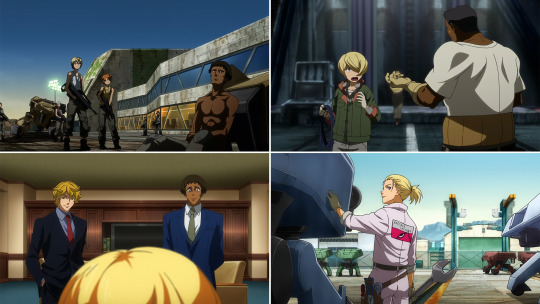
Chad/Yamagi doesn't appear to be a thread the fandom at large has pulled on much, likely because the pairing of Shino and Yamagi is so prominent, it eclipses a mere throwaway possibility. But I'm glad it exists within easy reach. And even if we take off our goggles, these lines demonstrate life for the characters has not stopped. The ex-slave and the gay kid are not stuck, trapped by the tragedies of their past. They have instead grown in both confidence and happiness and now have peaceful, stable lives where they're on going-out-drinking terms. That above all is why I wanted to explore this exchange: it reinforces Iron-Blooded Orphans' rejection of the idea the suffering people like Chad and Yamagi go through is perpetual or inevitable.
OK, one more character to look at. Let's talk about Orga and asexuality.
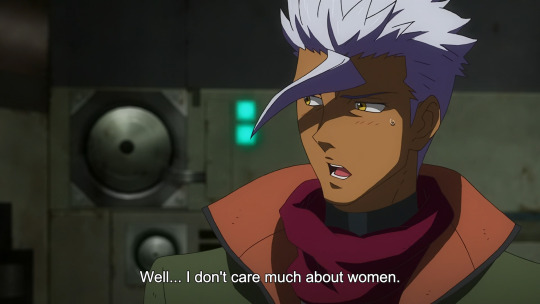
Orga Itsuka, leader of Tekkadan and instigator of the series' events, is notable for his charisma, his drive to provide a safe home for his comrades, and his complete unsuitability for the grown-up activities he attempts. Trying to party all night leaves him puking up his dinner. He forces himself into a suit and tie to handle the administration of a break-out paramilitary company, despite finding it stultifying and bewildering. His goals spin like a weather-cock, as he's surrounded by older characters possessing strong convictions while unable to stick to his own. And he is ultimately undone by an unwillingness to ask for help, having assumed that, as leader, he must decide everything alone.
I suspect his expressed lack of interest in women is intended to help convey overall immaturity. Orga is a good soldier and tactician, but he plainly isn't prepared for adulthood, lacking the grasp on the complexities of life that implies. Making him uncomfortable about sex serves to heighten the impression of a teenager trying to navigate circumstances for which he's not yet ready.
Relatedly, it should be stressed Orga stating he 'doesn't care' about woman is a response to Eugene asking if he agrees love and kindness are what's important, as opposed to Shino's endorsement of boobs. On hearing this response, Eugene proceeds to mock his commander for inexperience. That he himself has only just had his first sexual experience with another person and previously said much the same about not caring about sex simply proves hypocrisy is a fundamental aspect of Eugene's characterisation. The whole scene is very teenage.
Matters have not improved much when Orga and Eugene's dynamic is revisited in one of the side-stories released via the Iron-Blooded Orphans G mobile game. A year and change later, Eugene continues to act superior about having 'experience' where Orga doesn't.
Orga takes this rather poorly.

(Subtitles by @trafalgarlog)
Eventually Merribit has to shout at them to stop being brats, shaming them for behaving like argumentative children. It's funny – and then you remember they basically still are children and this is headed towards more carnage that will not spare them for being young. Such it is to engage with Iron-Blooded Orphans.
What does any of this tell us about Orga's sexuality? In principle, taking it as a device to convey immaturity, nothing. Orga's persisting virginity could simply mean he's not worked out this aspect of himself yet. He is a busy young man who likely hasn't had the time to try.
Alternatively it could mean he is gay. Mikazuki/Orga is an extremely popular ship in the fandom and we might take Orga's professed lack of interest in women as 'evidence' of him swinging the other way.
Or we could take my view, that Orga is asexual and his embarrassment is rooted in just not getting what the big deal is.
To immediately clarify, I don't think he is ace because he 'hasn't worked out what he wants', I think he's ace because he blushes on admitting he doesn't care about women and does not try to prove otherwise once he's in a position where he could easily do so. In circling back to the same joke for the side-story, the writers portray Orga as continuing to be uninterested in sex and sensitive over being needled about it. Again, a feasible interpretation is that he's into guys. Yet this is an argument with Eugene, whose response to the idea of Yamagi being in love with Shino is basically 'you mean you didn't notice?' Eugene is a dork and jerk; he isn't bigoted. None of the Tekkadan guys are. It's unclear if homophobia is even a factor in the setting. Sexism is, but when someone as superficially macho as Shino is comfortable with male/male attraction, and there are same-sex weddings inside Gjallarhorn, we cannot assume stigma exists around being gay. So why should Orga be worried, unless it goes beyond a question of who you're attracted to and into the answer being 'nobody at all'?
When you're surrounded by people who happily wax lyrical about how the joys of sex make you a real man, the absence of a libido might easily become a sore point.
Again, I'm supposing. Again, there is room to do so. As I touched on with Chad, it is easy to read queerness into the text when the assumption of straightness has been taken away, which is something this show does wholeheartedly and deliberately.
Orga Itsuka is one of the first characters I looked at and realised, not only shouldn't I assume heterosexuality, I shouldn't assume sexual attraction at all. I cannot credit Iron-Blooded Orphans alone with this. I do credit it with being a piece of media that applies itself to inclusiveness in ways quite remarkable for a show about giant robot fights, produced to market toys.
The word we want here is 'normalisation'. IBO has a lot to say about what constitutes 'normal' and a lot of it accords well with my own views, particularly those that have me twitching whenever anybody demands we 'be normal' about something. Normality is horrible. It is cruel and it is callous. 'Normal' is a world run on exploitation, on slave labour and on police savagery. Normal is children forced to risk their lives to earn the money required to feed themselves, because it is normal for their parents be gone, or incapable of supporting them. War is normal. Corruption of political systems is normal. Death coming more rapidly for those deemed expendable by society is very, very normal.
But so is protest. The drive to do something, to change things. The capacity for caring about each other. Love. 'Normal' is just a statement about what surrounds us every day, for worse and for better. In too many pieces of fiction, normality is narrowed, rendered a neater, cleaner picture, often excluding the kinds of people we might run into on the street, or walk past, or see on the news, distant and dehumanised.
Queerness is normal, yet for a long time it has been one of the first things to be cut out of fictional worlds. And when it is present, it's a big deal. An object lesson or a cry of triumph over breaking free of unfair strictures. I love stories about queer joy and victory. Heck, I'm a sucker for a good, soppy gay romance. But these aren't the only kinds of stories we tell. Sometimes we need to reflect the worst aspects of the world and what it does to normal people.
In attempting this, Iron-Blooded Orphans commits to an idea of 'normal people' that includes those who are gay or bisexual, those of colour and those we'd call white, the polyamorous, the illiterate, the desperate, the powerful, those who throw themselves into the fight with everything they have, and those who are simply kind. Those who are accepting, understanding and compassionate. Those who need to be accepted, who struggle to be understood, who suffer for a lack of compassion.
There are all sorts of people in IBO and – as a certain cheery, violent dumbass once said – man do I love it. I don't believe it is reading against the spirit of the thing to imagine more diversity than gets outright stated, to interpret one of the leads as ace or suppose another side character is bi or pansexual. It would seem entirely natural if they were.
Everyone's welcome here, down among the debris and the bloodshed, where hope is precious and fleeting and still somehow endures. So why shouldn't we raise a few extra pride flags?
Queer as in 'fuck you'
This all said, taken as a whole, Iron-Blooded Orphans is not a story about queerness or queer romance. Nowhere is this clearer than in its ending.
I skipped over the framing of the final scenes of the anime when I discussed Kudelia and Atra. They form a striking contrast with the ending of The Witch from Mercury, where the conclusion is directly focused around Suletta and Miorine's love for one another, their bonds of wedlock, and the happiness they have found together. This follows from the show being primarily about their relationship. In Iron-Blooded Orphans, the ending focuses not on Kudelia's feelings toward Atra, but those she has for Akatsuki, Mikazuki's son, with Eugene even saying she's eager to go see 'the man she loves', setting up a brief moment of uncertainty over who the character with Mikazuki's outline actually is.
The nature of Kudelia and Atra's relationship post-time-skip is implied rather than stated: in the English versions of the script, they do not refer to each other using terms suggesting they are married, although Atra has dropped her habitual 'Miss' from the front of Kudelia's name. They do not have wedding rings (redundant as those would be alongside the charm bracelets) and Akatsuki does not call Kudelia 'mom'. That they are raising him together is suggested very strongly, in line with Mikazuki asking Kudelia to be guardian of his child if he died. There are non-romantic ways of taking this idea, though, and none of these are closed off as viable interpretations.
But why should we expect some definite statement about romantic status when the point being conveyed is how Tekkadan's legacy continues to shape the world? This is a story concerned with the exploitation underpinning the world and the effort required to make even the smallest wide-scale change. It is about how people trapped at the bottom of the pecking order are still people, still human, messy and complex. It is about their pointless deaths, they ways they struggle on until those deaths come for them, and why they matter, even if the world forgets them.
Mikazuki, the living weapon, the human sacrifice for Orga Itsuka's reckless ambitions, leaves behind a child who will grow up in a more peaceful time, in a society slightly better off than when he and Orga were starving on Chyrse's streets. He doesn't live to see it; Akatsuki does. For all the failures, the attempt wasn't a waste. Don't you dare disrespect the people who died by saying it was.
This is where the epilogue centres, on Akatsuki and on Kudelia's cherishing of the world Mikazuki and everyone else built. Atra and Kudelia's relationship is there, a part of the gentler life they now have (Atra's desires were always towards the version of her existence where Mikazuki retires to a farm; here she fulfils the dream with Kudelia alone). It just doesn't need to take up space for the ending to land.
Yet, as I pour over how queerness is incorporated into Iron-Blooded Orphans, I find myself considering the struggles queer people face in reality. The victims of the AIDS crisis, dehumanised by indifferent institutions. Section 28 and the attempted destruction of knowledge around non-heterosexual forms of love. Riots and campaigns, voices raised loud and proud. How we are equated with dirt and corruption, reduced down to facts others find disgusting. The name-calling. The petty, pathetic posturing that makes everyday existence pointlessly harder.
So it goes for space-rats and degenerates alike.
I am lucky. My life is about as far from that of a child soldier as it is possible to get. My sexuality has been largely invisible. My gender matches the one most favoured by my society. I still have more common cause with those born in poverty on the other side of the world than I will ever have with the aristocrats and billionaires who shape the direction of my country. Because we hold many causes of misery in common. Because we share the same capacities for joy and suffering. Because our humanity is so easily cast aside by those we will never be able to touch.
There is always a place for stories uncomplicatedly about queer love conquering all. Equally, it is important to recognise the places queerness overlaps with stories about the many other ways the world casts people out. It is vital to be able to explore loss, futility and heartbreak. It is essential to capture why we strive onwards despite how heavily tragedy might weight us down.
We may be doomed. Our lives still matter. To ourselves, to each other and, whether they remember or not, to those who come after us.
So, no: for all the queer characters it contains and the many more we might trivially imagine queerness into, Iron-Blooded Orphans is not gay in the vein of The Witch From Mercury. It is not a happy story.
But it is a tenaciously hopeful one and, from certain angles, that alone looks queer as hell.
---------
Happy UK/US Pride Month – in honour and memory of Marsha P Johnson and everyone else who refused to go quietly.
I shall leave you with one of the least straight things ever to be included in any Gundam show.

[Index for further writing]
#gundam iron blooded orphans#gundam ibo#g tekketsu#tekketsu no orphans#gundam#turn a gundam#reference#notes#queerness#queer love#queer characters#analysis#spoilers#queer is a reclaimed slur and a term I apply to myself#heaven help you if you think this is the place to argue about that
103 notes
·
View notes
Note
potential culture shocks for Bojan in Finland? 👀 do you think he has something more to add to the list next to very chill waiters and suspicious door handles?
hmmmmmmm i might be the wrong person to answer this because to me nothing about Finland is a culture shock or weird lmaoo something in the same general category as door handles and locks (which apparently are unusual to a lot of foreign people..?), one thing that comes to mind is sisäovi. jere's place is so new that he probably doesn't have a sisäovi but those seem to confuse foreigners sometimes! it's a door right after the front door, so like, you open the front door into a home and bam, there's another door to open right after. their point is insulation and soundproofing but they're not as common in new houses anymore. it's a shame jere probably doesn't have one, because i'd like to imagine bojan not expecting another door right after the front door and walking straight into it 😌 also, fun fact! in finland doors that lead outside (almost) always open out (except of course sisäovi has to open in, because you can't exactly have two doors right after one another opening the same way). there was an order to make it so in 1882, after six mass hysteria disasters in christmas churches between 1669 and 1882 killed 97 people. the common thread was that people thought there was a fire in the church (there wasn't, in any of the cases) and then tried to escape in a wave of mass hysteria. and in three of these cases people then got trapped, when the big church doors would have to be opened to swing inside the church, but the mass of people swarming to the doors made it impossible to actually open the massive doors. so people got trampled and suffocated between the doors and the mass of people coming from behind. and so in 1882 they made it so that doors in churches had to open out, and that has been the custom with all other doors that lead outside too. this has been your finnish history/culture lesson of the day that nobody asked for.
#i am unable to not share things I Know and Have Heard Of when given the chance#and sometimes even when not given a chance at all#i will just give myself that chance#and start explaining something nobody needs to know#some of the perks of knowing me is knowing an insufferable besserwisser <3#ANYWAY thank you for for ask anon mwah!!#asks
22 notes
·
View notes
Text
Okay I haven’t read the last lesson yet but I will get to the ones I’ve missed and read them all at once.
In the meantime, what I’m getting is it’s time to write stories to fill in the gaps.
When I did my poll about what long story to write next, the one about Solomon & MC in Cocytus Hall won, but the one about Solomon & MC meeting before the exchange program was a close second.
So I think I might combine them. And develop the answers to who is Nightbringer, what did Barbatos do when he was younger, why did Solomon summon him, and all that history we never learned. I don’t think we’re likely to get these answers anymore so I’m gonna make up my own version of them. It’ll probably take me a while to write this story but it’s something I’ll be working on.
Also thinking about writing more stories about my OCs and I really wanna expand on my version of the reapers specifically. So you can expect more of that from me.
I definitely want to write more Barbatos stories again I feel like I haven’t written for him in a while. I might do a Threads sequel but I might just write something new. We shall see!
Anyway, thank you all for being here. I hope you stick around for more fics about our favorite characters. And if you’re interested in my writing and would like to see more of it, you can follow my writing blog @misc-chronicles. And if you just want a lot of reblogging and personal complaint posts, you can follow my main lol @misc-magic.
Thank you for reading, I love you all.
#oh yes and I swear I WILL get to the reqs I still have#I know it’s been months#but I promise I will do it#obey me#misc rambles
33 notes
·
View notes
Text
Marcille’s dress: threads and importance
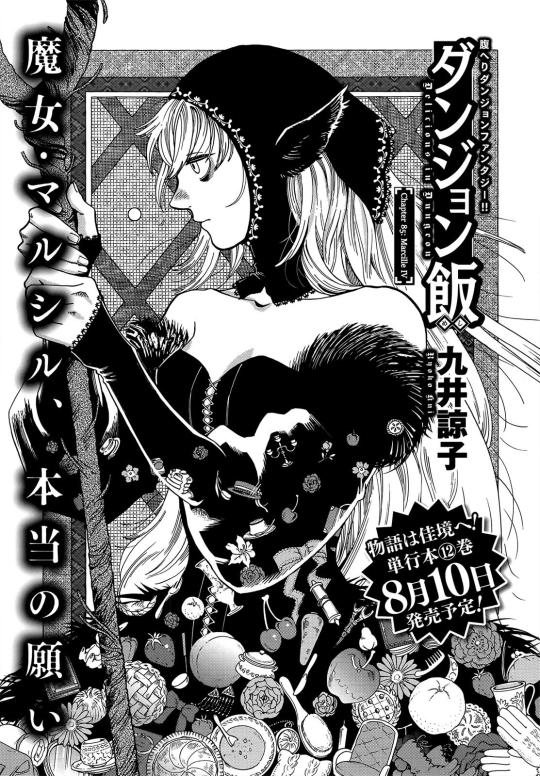
This was supposed to be part of my upcoming Marcille & Chilchuck arc analysis, since it’s all about the themes of fantasy and confrontation with reality in Marcille’s arc, her mental state and fairytale coding etc etc, but that already was long af and this is something good to have as a standalone anyways, so. Here we go.
……….. So first of all it is 12 of august and suddenly my work phones are ringing to break me the news:

So this interview came in right when I was working on this analysis again. This now confirms the main intent of what the outfit was meant to evoke. There’s definitely a looot to look into just this and we’ll be going into it, but a complete analysis of Marcille & Momcille analysis would be ideal & that’ll be for another day. We will be bringing her up often throughout all this though.
So. "Why should I care about Marcille’s outfit?" Beyond possible story importance, on a metatextual and thematic level, analyzing imagery something provokes can be valuable and compelling even if it isn’t intentional or is flawed (historically inaccurate, etc). Less narrative wise and more character development wise, the lion does say the dress was to give her courage, and as her demon his job is reading her heart and giving her what she desires. What does her outfit say about her overarching character and her current mental state? Why does it give her courage, how does it do that, what part of it does that?
Like I just implied, when talking about this sort of thing, there are two aspects: the personal meaning something holds for the character, and imagery for the audience, which may or may not align with said character’s perspective or intent. Character vs meta. Because of the meta aspect, imagery can be disconnected from the character or the wider narrative, or that disconnect can itself be a tool to show the character’s mental state, unable to recognize or reconcile how different to their intent their being comes across as. This is to say that all of the analysis angles I’ll be bringing up in this post can apply to the same analysis of Marcille’s character and psychology, even all simultaneously. The different sections here are more or less ordered from most meta angle first to most character-motivated and strictly analyses of canon last, with little interludes examining specific aspects of the outfit regardless of reading. Imagery here will be looked at as a framing device, a way to comment on the themes and her character or her arc. For fun! Forward march!!
Table of contents:
Shepherdess: guidance.
Sorceress: power.
Princess: fantasy.
Funeral gown: mourning.
Mother: emotion, balance and identity. The conclusion ⭐️ Skip to here for strictly analysis of canon intent
Shepherdess
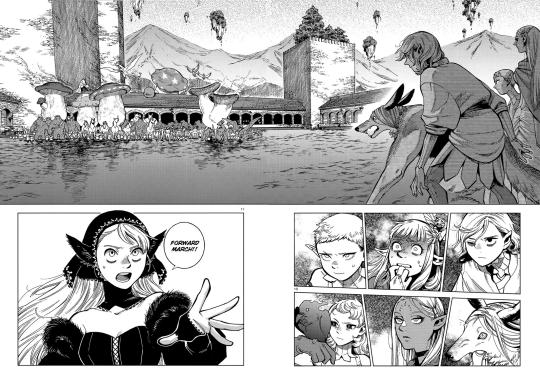
We’re doing an iceberg but I start from the bottom and make my way up, the shepherdess reading is the most meta one but it’s also the one I’m most interested in covering. It’s the longest section and the one with the biggest (only), um, history lesson. Feel free to skim if you only want the conclusions and not the reasonings.
Marcille? A shepherd? In action and wider imagery, the links are more or less straightforward (and will be discussed), but first I want to tackle the visual aspect because it was the most striking part of it to me and it’s the most complex one to explain…
The shepherdess look has been honed into a specific image in modern consciousness. There are always the same essential elements: a curved hook staff, a hat (often a kind that curls around the head), a poofy skirt for an elegant dress (wether fancy or modest), most often with lacing down the front and some cleavage. It’s of course not anywhere close to a perfect match if you compare Marcille’s dungeon lord outfit to pictures of shepherdesses, but it is very reminiscent. Nowadays, the classic hat of shepherdesses that Toy Story’s Bo Peep is emblematic of is indeed considered mostly a child’s accessory as well, halfway between a trimmed hat and a cap, has the shapes of a bonnet, so this coincidentally also lines up with the elven earmuffs as I’ll touch on later.
What
Wether or not seeing Marcille’s dunlord outfit will have reminded you of a shepherd probably depends decently on culture? I did research to get material for this and the start was real rough let me tell you— the only things I could find were… Bo Peep from Toy Story and illustrated nursery rhymes. In modern times, the image of a shepherdess, "shepherd woman that looks ladylike", is only a vague understanding we’ve gathered from the few woman shepherds we’ve seen in media that weren’t meant to be historically accurate. Myself, without Toy Story it’d only have felt like hazy fever dream memories of illustrated nursery rhymes from my childhood. It’s impressive that this concept still persists even if it’s only perpetuated through ONE character and a niche archetype, and for the word shepherdess to have had such a strong association with this look in my mind still.
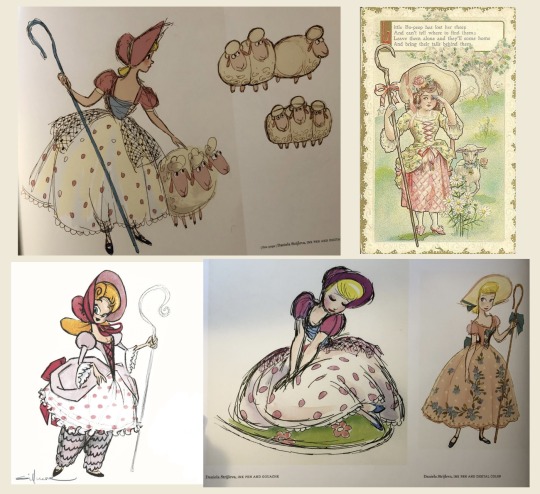
Above: concept art for Bo Peep from Toy Story by Daniela Strijleva and Jean Gillmore, herself based on the nursery rhyme Little Bo Peep whose depictions are always in this style of outfit. Top right is a depiction of Little Bo Peep in a 1913 postcard, unknown artist, but if you want you can look up for vintage picture book depictions as well.
So what the hell? Where does this very specific look for the concept of a woman shepherd come from? Where does this conception, this specific shepherdess style wear and figure originate? Well the specific term that’ll get your research results is indeed "shepherdess". Art history time let’s go.
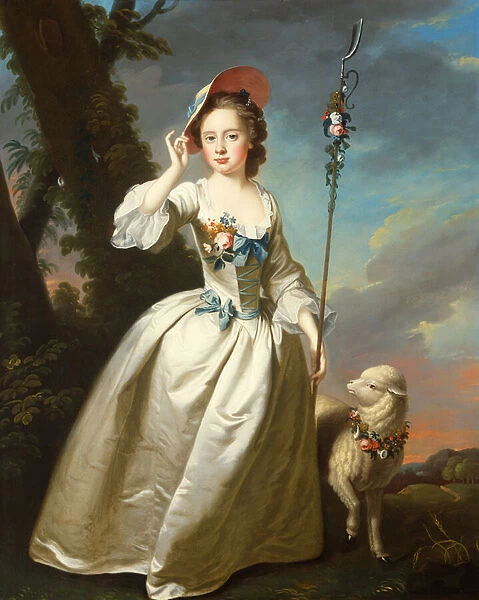
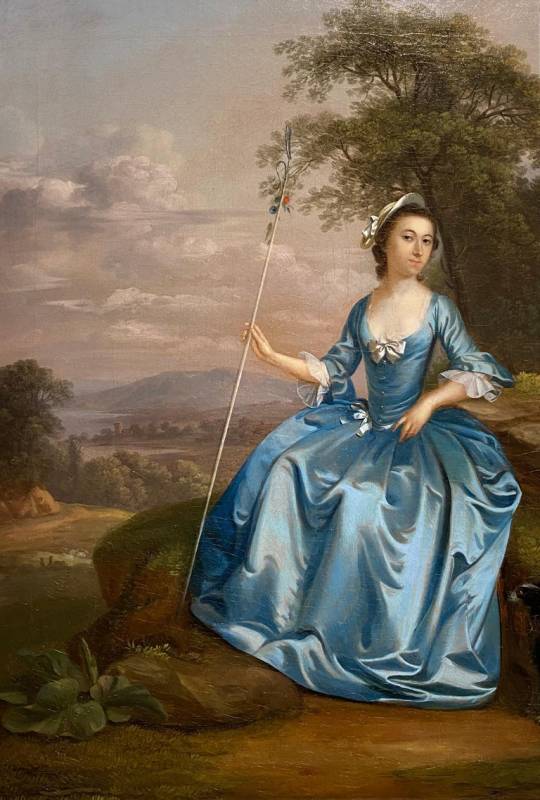
Okay so there’s no way those people were actually shepherds, right? What’s with that? To cut to the chase, turns out it’s mostly a trend that popped up in 18th century, one most associated with rococo but also with romanticism. Yes yes, a trend. The bourgeoisie deciding from hearing about the painted selfies of other ladies that dressing as fancy versions of poor people is hip. The new hit, becoming a dainty ladylike shepherdess for a day!

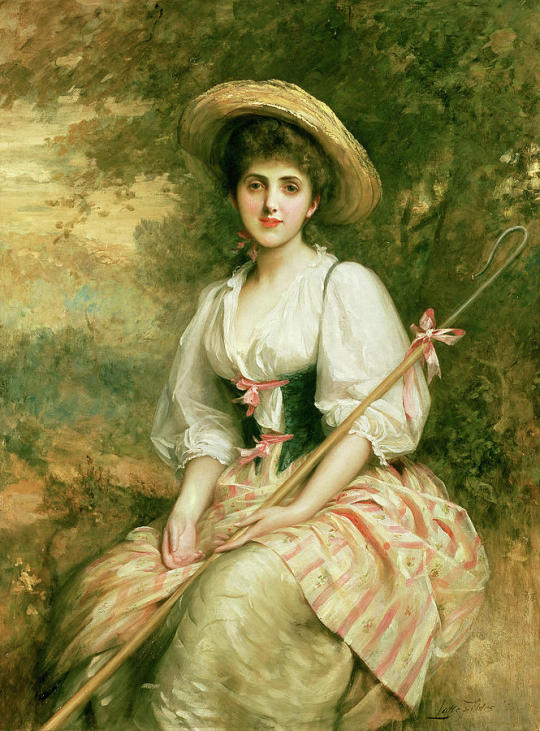
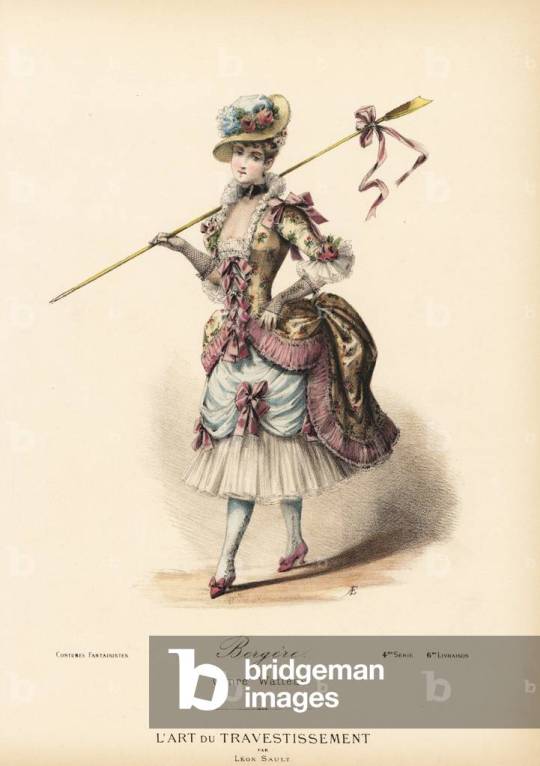
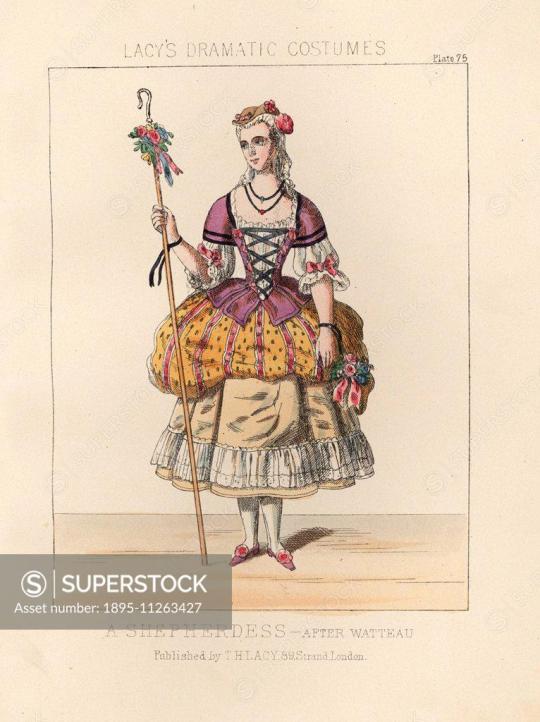
Artwork credits: In order, 1: Thomas Hudson (1701–1779) / 2: Arthur Devis (1712-1787) / 3: Jean-Honoré Fragonard (1750-1752) / 4: Sir Samuel Luke Fildes (1844-1927) / 5: Léon Sault (1839-1921) / 6: T. H. Lacy (1865) Some fun extra sources: Anecdotes: "Marie-Antoinette playing shepherdess", statues by John Cheere, Essays: Extravagance in revolutionary times: ladies of rococo, cottagecore through history, haven’t read this one but focuses on the shepherdess figure in 18th century plays and scultpures
Googling "ladies dressed as shepherdess" will give you a slew of 18th century portraits of, indeed, well-off noble ladies having portraits of themselves painted while dressed as "shepherdesses", well, the romanticized version of one anyways. I also found one from the 1650s. The trend also continued onwards, albeit less so once culture moved on. The word definition itself acknowledges this, unlike its french equivalent, as far as I know women shepherds are often still just called shepherds, meanwhile the shepherdess as per the Oxford dictionary: a female shepherd, or, an idealized or romanticized rustic maiden in pastoral literature. I don’t think I can do the explanation of the phenomenon’s origin and cultural context better than the essays I linked so I’ll quote:
"During the 18th century, an artistic movement known as Romanticism spread throughout Europe, seeking to evoke an idealized world of rural simplicity in contrast to the urban, industrialized centers of the cities. This nostalgic vision of a peaceful countryside was expressed through various art forms, including oil paintings and lead garden statues. The subjects of these artworks often depicted shepherds, huntsmen, and other rural figures, presenting an idyllic way of life, particularly for urban audiences." -Vizcaya Museum
"The cottage core aesthetic that people think and strive to attain, follows the ability of the wealthy class to be able to get away and take a break from the aristocracy and city life by escaping to the country. Marie Antoinette was an example of this, “… she had an entire hameau (rustic village) built as a place of leisure: it comprised meadows, lakes, grottos, streams, a dovecote, a dairy, cottages, vineyards, fields, orchards, vegetable gardens, and pagan temples. It was a fully-operational farm, where the queen would host social events. She and her entourage would “cosplay” as farmers and shepherdesses.” Marie Antoinette shows the “pretty,” the fantasy that people want, people want an escape from their reality. Cottage core is very different from one’s life, and the lack of knowledge of the true struggles of simple living, farming, and other cottage core elements makes people imagine and create a fantasy." -ZOESTAM1 (you’re a legend ty)
"Renowned for her great interest in fashion and more notably her extreme extravagance, Marie Antoinette set this ideal of the common shepherdess or milkmaid through her enjoyment of dressing in costume. She would often don the clothing of a dairymaid, a pastime that went so far as to see her commission the building of her own personal dairy at her palace Le Petit Trianon. These Rococo versions of lower class dress feature heavily in rococo painting such as in Fragonard’s The Shepherdess (1750-52), where a middle class woman is seen wearing a highly exaggerated interpretation of the dress of a lower-class woman. However, despite complying with the details of shepherdess dress it still features the expensive fabrics that are seen in images of Madame Pompadour. This interest in the pleasures of pastoral life shows the extent of the ‘myth and fairytale, festivity and fantasy, theatre and music’ that was epitomised in the paintings of the elegant women of the Rococo. The dresses made for and worn by the ladies of the Rococo are emblematic of the changes in society. The newly found ease of life for the middle class is seen in these images through the mythical landscapes, statues that appear to come to life and through the elaborate dress of the figures that combines a sense of the élite with that of the costume of common man. Wolfgang Menzel describes the Rococo in 1859 as a time that represented ‘empty and meaningless ornamentation’, a feeling that was certainly shared by the lower classes of Paris and one that was expressed in the French Revolution in 1789. The revolution sought to punish those of a higher class, meaning that figures expressed in the paintings of Fragonard, Boucher and Watteau would be guillotined within the same century." -Gabriella Sotiriou
To be sure, there have also been depictions of shepherdesses in history that were realistic and accurate, humble, commonfolk, both before and after this movement. There’s just this… Sweep in the 18th century that forever changed the aesthetic associated with the shepherdess figure in a part of culture.
So to summarize. Rich ladies LARPing as rural peasants for fun and portraits. From there you can easily see the throughline of how this very elite vision of a shepherdess would become the model for if, say, a children’s book illustrator wanted to design a shepherdess for a nusery rhyme, books which at the time would be luxury goods, the target audience noble little girls who should aspire to look as cute, elegant and well dressed as the shepherd girl in the book. Okay! We just have to get lost in the sauce a little more before getting to a full look and conclusion.
More fun context, in english the main shepherdess nursery rhyme is Little Bo Peep, don’t ask me how it goes I have no clue. But in french I could mention many like the nursery rhyme Il était une bergère (there once was a shepherdess) that comes from the 17th century, but the most sung one and the one I knew growing up is Il pleut, il pleut, bergère (it’s raining, it’s raining, shepherdess) originally from 1780. I did not expect this when starting to fall down this whole rabbithole going "Haha dunlord Marcille kinda looks like Bo Peep", but looking at that latter song’s wikipedia page there’s a whole thing there too. It was sung right after the storming of the Bastille during the very beginning of the french revolution in 1789— In which the opening lyrics, warning the shepherdess that rain is starting and a storm is coming, to "get your sheep, go home, and take cover"(though more poetically), became more goading than the original fairy godmother energy. The shepherdess here in this revolution context became the queen Marie-Antoinette, and the rainy storm is the french revolution brewing. It is said that that the author of the song hummed it at the gallows before being executed at french authority’s decree. We see then just how much the figure of the rococo shepherdess became a symbol with hated connotations and ties to rebellions.
So! The figure of the shepherdess is hazy to most people nowadays, but historically it was associated with excess, extravagance, classism, misused unearned power and the then-queen of France. It was both the ignorant and selfishly idealistic aesthetic that the queen wished to embody and that twisted the original commoner humble conception of a shepherdess, and the infamous image embodying her faults that was then used against her in mocking resentment and revolutionist sentiment. The representation of the fantasy world she created for herself with her power, and the ironic reminder of the real world she was exploiting and ignoring to do so.
You’ll notice the shepherdesses are typically blondes, especially in Bo Peep or more modern depictions. Marcille’s name is french.
What
… But all of that was just to inform on the topic before we got to the links and parallels that can be drawn between it and the story & Marcille, and to prove I’m not making up "the shepherdess look" in the first place. I already briefly went into visual similarities and appearance-related connotations (bonnet, rounded staff, dress with cleavage, lacing like a corset, poofy skirt, elegant and formal yet promiscuous undertones) in the previous section, so now I’ll be properly going into what this comparison can mean for her and for the narrative.
I summarized this section as shepherdess: guidance, and ultimately that’s what I think this focuses on best about her.
I do a quick overlook of her mom friend tendencies here (+ here) if needed, but I think we can agree Marcille often acts motherly through canon, not only fussing over her friends and coworkers often overbearingly so but also directly caring for them like helping them bathe, enjoying being able to do that for people she cares about (washing Senshi’s beard included). But also, often deciding herself to adopt a sort of wisdom-imparting dynamic within a group or relationship where she knows what’s best for others better than the individuals concerned do, where she’ll scold or push others out of their comfort zones as if she’s doing them a favor (Chilchuck), where she’ll talk in a holier-than-thou tone about a topic (often an academic or moral one), that classic long lived race condescension as some characters put it.
So isn’t the figure of a shepherdess, one who cares after sheeps, one who directs them in a direction she chooses and watches over them grazing the grass as their protector guardian and guide fitting? Isn’t that what she figuratively wants to do, obtaining unfathomable power to shape others’ lives quite literally even to the point of changing their lifespans regardless of their thoughts on the matter, being a figure that chooses for them and keeps them safe as someone who knows better? A bundle of good intentions and genuine care, but still patronizing and robbing them of their freedom of choice. I’d argue this is a large part of her arc with Chilchuck, and even for her dynamic with Izutsumi! Looking at Marcille saying farewell to Izutsumi near the end when she thinks she’s going to prison, it’s easy to wonder about how this is the same Marcille who once refused to trust Falin’s judgement and choice to be with her brother, thought she shouldn’t be away from her and what Marcille decides to allow and not allow for Falin’s career— the same Marcille who here in tears with Izutsumi is telling her to take care of herself as she leaves to travel alone, trusting her to make choices for herself by herself and supporting her in it even through her heavy emotions and the grief and loss she’s already anticipating, but learning to accept.On a more literal parallel level, in this last arc she commands an army of monsters at her will effortlessly, making them march towards the surface and then into battle. Sending out orders through her hands, words and staff like a war general, ready to choose to change the world to fit her wishes.
As to what feelings dressing like a shepherdess could quell, I think it’s a way for her to reaffirm her goals and feel certain in them. Her friends she respects just told her that her lifelong goal of extending everyone’s lifespans is a pipe dream that could do harm as much as good, and even though she ignored her it did shake her, it is after that and just before the upcoming battle that the winged lion deems she’s in need of a morale boosting wardrobe change. Marcille feels more directionless and aimless than she should, so the winged lion gives her an outfit that reaffirms and steels her goals, examplifies her motherly and controlling instincts and validates them, encourages them. Wouldn’t a shepherdess figure make sense then?
The fakeness aspect of the shepherdess fashion also reflects how she’s not fit to be a proper dungeon lord, as that requires maintaining an ecosystem that she doesn’t have the knowledge, experience or will to manage. She’s a shepherdess in looks and has the power to command people places, but she doesn’t have the hands-on farming experience that is needed to make a dungeon lord a competent one, a good gardener so to speak. Marcille has high academia knowledge of dungeons but when it comes to basic care that’s more in line with farmer experience, she’s largely stumped. She lets herself be moved by aesthetics rather than practicality, like with her spiders and her coatl.
If we put the history of the shepherdess figure in context with her arc, she wants to mimic the look of a folk hero, while still being privileged with power she can exerce over others. It gets to a key trait and arc theme of Marcille: romanticization. Which is in big part tied to her idealism, and that idealism often makes her more resistant to accepting things, but now I’m getting ahead of myself.
(Ironically, as we’ll go over in latter sections) This can also reflect how Marcille’s mother was an elf, presumably from high elven society from her elegance, court etiquette and magical skills- (meaning she likely got a good education), but moved to a tallman region feeling its culture less stifling and more fun, prefering its food and clothes etc etc. She’s still court mage, but to elven society being part of a short lived race’s court is a downgrade from being part of elven society at all, so here the "noble willingly becoming "lower class" because they find it pleasant or fun" is fitting. (Not an actual critique of her choices or morals whatsoever, just an observation.)
Marcille is not seemingly in touch with her elven culture. The dress tallman fashion, but the earmuffs would be elven, perhaps denoting the wrong or fully romanticized usage of it. Like meshing two things together that clash— in-world in this case cultures, but here in context it’d be class, and as we’ll touch on later in another section, identities.
Marcille also grew up around in a rural region surrounded by "books and chickens", so it’s not like a rural identity or a relationship with farm animals is fully irrelevant or separate from her as a person. The chickens make the egg imagery Marcille uses to explain souls in the same body and in some art extra interesting.
Like mentioned, shepherdesses also obviously have an association to lambs and goats especially. Which is fun not only for figurative parallels like her leading the monsters and everyone like lambs to slaughter into war but also how the demon has been shown as a goat and a sheep before. In a way though, Marcille is the lamb innocent as she is and the demon is the shepherd. After all, Marcille’s dress even has some animal-like features, fur all over including her ears and even a tail. The dress is not only to make Marcille feel more confident, but to distract Marcille from having second thoughts and self-doubt that could make her think better of being a dungeon lord, like she ends up doing after talking with her party in the tower. The demon takes on forms to lure in his victims, as the adventurer’s bible puts it forms that make his victims trust him. At his very beginning, he would take on the form of food and offer himself up for eating. Similarly, I think it’s interesting to consider the dynamic between Marcille and Winged Lion as one where he presents himself as a servant, as the one guided and ordered and not the one pulling strings and walking her like a sheep to breaking him out of the dungeon. You could also mention how the sheep form the demon has taken before is when he was traumatized in a way— The time all humans died around him that made him live in loneliness for what’s implied to be quite some time, the time when he reconsiderd his whole approach from people pleasing towards cunning and control.
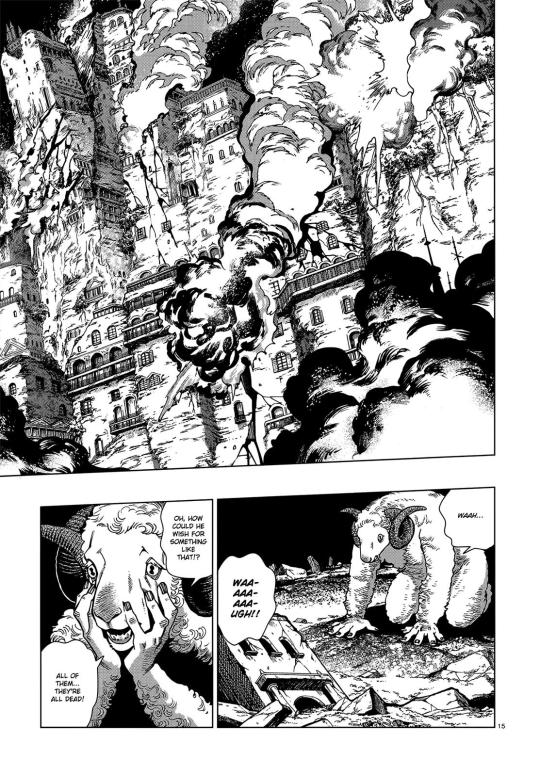

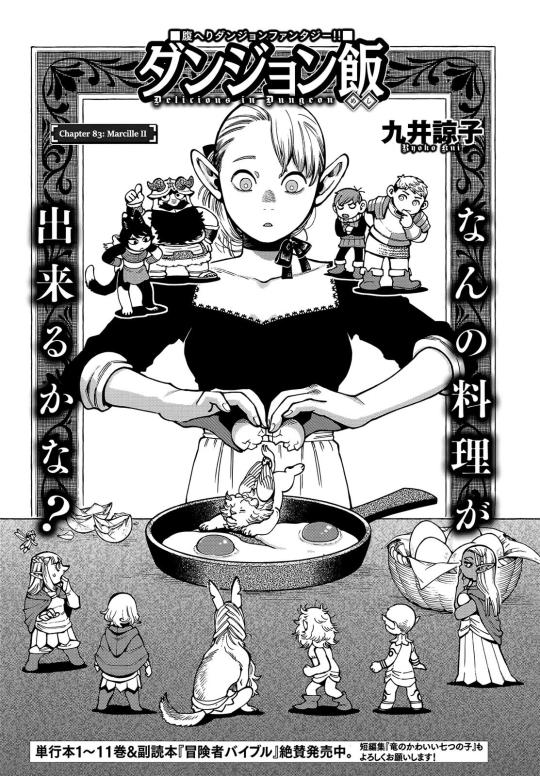
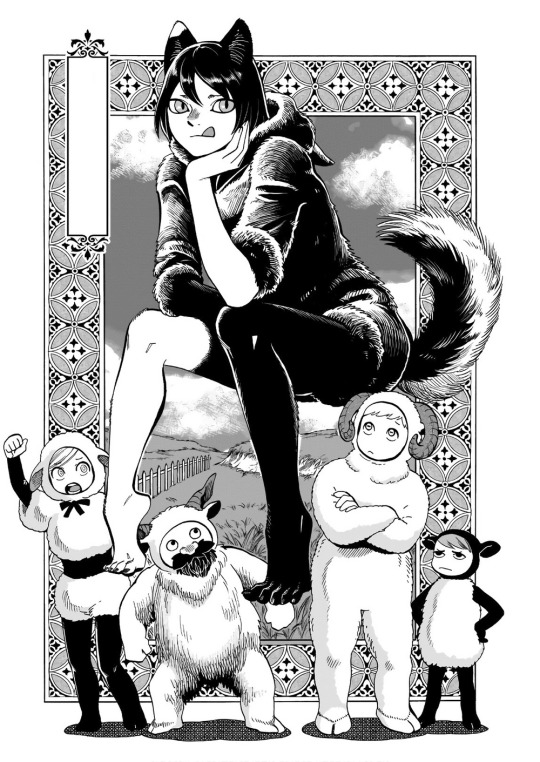
Tldr: - History makes it a good comparison for aesthetic-obsessed well-off people who want to play folk hero while actually being selfish or misguided, it’s a paradox of a humble station represented by unattainably expensive fancy flourish and frills. - Marcille herself is of rural origins where she interacted most with books and chickens. She has a taste for over-the-top aesthetics and dresses (not as much as the golden kingdom’s people, but enough to desire her dunlord dress) and novels, and she is a mom friend type, caring after others (in bathing and dressing and healing and comforting and guiding) - As a dungeon lord, the way she commands an army of monsters in perfect synchrony with shepherdess-like staff in hand makes the shepherdess comparison very literal. The demon having been notably a goat, a sheep and maybe even a lamb in the past also makes this imagery more compelling and fitting.
This angle shows Marcille wanting to take on the role of the shepherd, the lighthouse so to speak, the mother that guides the people whom she wants to change the life & world of for the better. They need only follow her lead and they’ll be shown how great their life could be.
Where does this imagery fall? Definitely all meta and not in-world, this is for the audience and has no in-world acknowledgement whatsoever. Again. I know this was kinda insane, this is the most wild and meta section of the post like I mentioned and like I implied I don’t even personally think it was intentional on Kui’s part honestly! But as art doesn’t exist in a vacuum, even when there’s no intent, imagery can bring an interesting and relevant framing, angle or flavor to the original text. A lot lines up well and there are small coincidences, but again I am not saying Kui intended Marcille to parallel Marie-Antoinette help. Isn’t it kinda neat though… Just a little bit…
Okayy so things are calming down from here on out we’re cruising guys
Interlude: earmuffs, elven but childish
It was important for me to get a groundwork analysis done for the earmuffs before going into the next ones. This interlude has a focus on supporting the shepherdess section with comparisons, but I want to take a moment to focus entirely on elven earmuffs, their connotations and existence as an in-world fashion accessory, and thus environmental context for how Marcille may see them.
So, if we go back on the shepherdess for a bit— The shepherdess fashion had a hat iconic enough for it to be called the bergere hat, but the type that’s more associated with them nowadays is the type that Toy Story Bo Peep wears, which is a bonnet.
To me it’s intuitive to say that elven earmuffs are very alike bonnets, even in cultural context. I recommend browsing the wikipedia link I put for the pictures. It used to be very widespread and popular headwear, and to be fair probably still is even though not fashionable much anymore. It used to be, though, fancy pretty laces and this and that were put on it and trends were made of it. A type of bonnet especially has become emblematic of the shepherdess look, like mentioned.
The elven earmuffs are subject of discourse within the fandom and the biggest reason is the age connotation they have, and I do have to say it’s less strict in practice than people like to say. Kui not only keeps herself from explaining the social perception of them in a categorical end-all be-all way, but we also see a range of earmuff designs worn by adults in the doodles. We see that adults can and do wear them even if we don’t have much coherent context for it, and perhaps more importantly we see it implied that there is a market for earmuff designs especially with the fashion of it, which solidifies there are customers and adult customers for them.
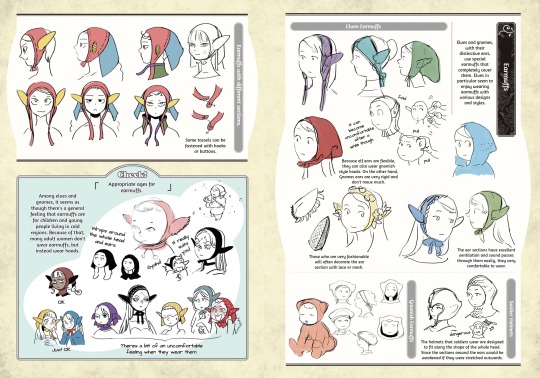
Similarly to bonnets irl, it might feel weird to see an adult or anyone wearing it, but it’s not like it’s illegal or strictly reserved to some kinds of people. Rather, it’d be embarrassing, like the elven bonnets in Dungeon Meshi. It covers ears while still looking and feeling dainty, often accessorized and designed with lace or ribbons. It’s very strongly coded with babies and was very popular across baby dolls, ads, etc, though it’s starting mostly considered vintage nowadays. Though these are associations so strong that for example in Alice in Wonderland, the original book like the 1999 movie, when the baby gets transformed into a pig, understanding that the pig is the baby and A baby remains smoothly because it keeps its bonnet. It helps sell it.
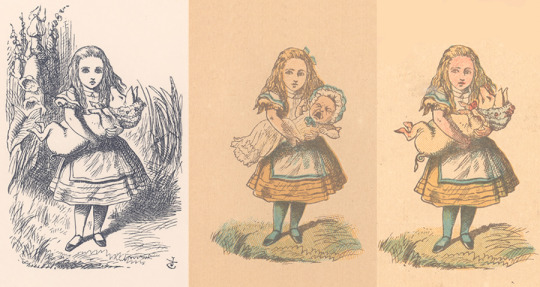
(And if we’re referencing Alice in Wonderland while talking about Dunmeshi, psst, look up the chapter cover for chapter 64, rabbits 1)
Beyond babies the traditional simple bonnet is associated with rural people especially women. I do not want to sound like a bonnet expert because I am not— but from my understanding it does make sense if in occident rural people are the majority of who still wears them to this day. One reason being that more isolated less rich regions tend to care about being trendy less, and expectations on dress differ from region to region of course— And that’s a point I want to make about elven earmuffs, because I do think especially in colder regions like Kui mentions they would be more widely used and considered commonplace for older adults like perhaps the ones in the doodles. Just like how gnome hats go in and out of fashion constantly, Kui does have a good grasp of how fashion can be treated and coded amongst people and groups. It’s earmuffs for a culture Marcille isn’t fully in touch with, so it could take part in reaffirming Marcille’s identity and belonging in it, wether or not she knows all of what it implies. Like said, in the pages we see seemingly earmuffs high fashion for adults. It’s something young teens and young adults are said to be culturally ok to do, and people do generally like to look young so, it could be part of the cute hip young woman look. Would it be thematic for her to wear childish outfit? Yes, but I honestly can’t see it bringing her "courage" much if that’s the main intent. We’ll talk about it more later though.
Some do say that historical fashion is Kui’s weakness so to speak lol, and I’m not one to disprove that. Again, I can’t claim to know what Kui intended or didn’t intend to do and where she got inspiration from consciously or not.
Sorceress
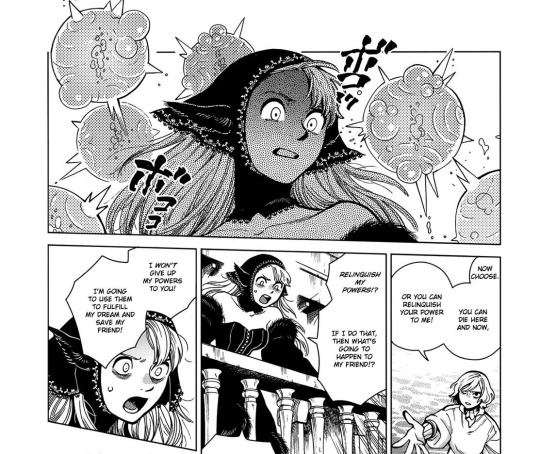
Okay okay okay my enthusiasm for explaining historical/trope meta sorta started and ended with the shepherdess let’s get this done. I am interested in laying the groundowrk that I’m not making shit up in pop culture and for that I have to build up context so we’re all on the same page, but this is just what it says on the thin. If you want a recap of tropes surrounding black magic sorceresses and how they look beyond the minimum, here’s a couple relevant tvtropes pages: Evil Wears Black, Evil Costume Switch, Evil Sorceress, skimpy villains. More interestingly, you could argue that Dungeon Lord Marcille apparents herself most to the vain sorceress, even though what she would like to be is closer to the lady of black magic akin to her mother’s demeanor, and meanwhile the regular Marcille we know and love acts most like the black magician girl. The latest I would have never guessed existed is a trope of a spunky outgoing girl deuteragonist who’s gifted in dark magic and it’s honestly really fitting, which I find a really on the nose coincidence. This is still optional, beside the points I’m about to make.
Marcille, like Chilchuck, is concerned with reputation and social perception. Beyond other examples of it, there’s how Marcille prefers to let other people believe she’s a full elf and how Thistle’s shaming affects/embarrasses her — her reason for not being upfront about her origins socially not being shame but that it’s a hassle to explain and deal with, the questions and judgement and differential treatment, but moreso!!! There’s how similarly, she’s not ashamed of her dark magic research & knowledge, but she avoids talking about it. She knows it’s a touchy topic and kept the main topic of her research a secret for 2 years of working together. It only came to light because it was absolutely necessary to save Falin. She knows the reputation of dark magic and readily fires off counterarguments to Chilchuck talking shit about it with quick practiced ease.
But now as she becomes a dungeon lord and the canaries know everything and they’re are after her, there’s no more hiding or pretending or deflecting. She embraces the reputation of dark magic and her academic identity fully with an outfit that screams "I’m a black witch" and wears it like armor.
This is more in line with what the people who don’t know Marcille were framing her as during her dungeon lord stint, Marcille’s in-world image at that time, the same way Thistle became known as the mad mage with time. Evil sorceress. Dark witch. It’s the epic villainess look. Mixing Maleficient with a D&D seductress look. It does a lot of skin especially for Marcille, off the shoulder sleeves, a line of skin showing from inbetween her breasts to her navel, a skirt cut like Rin’s dress... The deadly sin of lust in french is the word for luxury— lust is desire but it’s for as money or power as much as sexuality.
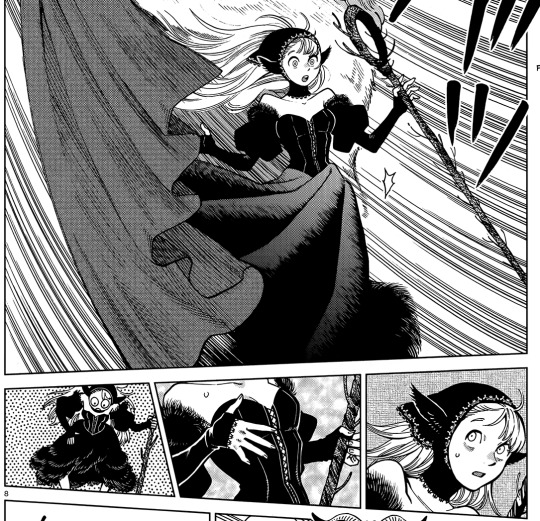
Unlike with the shepherdess there’s less specific boxes to check. The main’s color black or at least dark, there’s magic (preferably black or forbidden or cursed) and the outfit’s feminine and elegant and a dress? You got the winning recipe. Then there’s extra boxes like having a fur or feather trim, having a magic staff, long sleeves… If you want examples beyond literal Maleficient, I’d google for sexy sorceress halloween costumes lol. Google also showed me some AI art that’s exactly what I’m talking about whole looking those up and that sorta drives the point that this has become a vague but striking figure. We’re not operating with poofy skirts here, that’s for the kooky villains. But the length of the skirt and the vibe is right, and fur and especially feathers aren’t unheard of tacked onto their dresses, which ironically Maleficient both wore in her important 2014 movie, funnily enough the year Dungeon Meshi’s serialization started. Though, especially with her barefootness it also gives her a of… Lost fey witch vibes more than dark sorceress, depending on how you see it.
Oozing maturity makes you feel in control. It makes you feel adult and powerful and independence. This is also very true for the mother section later on, but here we focus on the confidence aspect and less the assurance, if the distinction makes sense— Confidence coming from within yourself and assurance coming from an external source in this case.
"Fumi you’re saying Marcille wanted to look like an evil sorceress?" No! But unconsciously or not she’s drawing on these vibes. She’s done hiding and she’s done hiding the topic of her research and what she’s ready to do to succeed, the extent of her determination, her "dark" magic, that very term she’s been fighting against. She’ll wear a dress that reflects that and gives her confidence in pursuing what she wants in plain sight. It’s relevant for this to remember that Marcille getting her dunlord makeover is soon after she had a conversation with her friends who tried to talk her out of her biggest trauma and purpose and want, even laughed at her goal, and juuust before a huge life or death battle. She laid it all out bare and told the full story and the full truth and argued a bit, and now she’s sent them away for a time while she does her dunlord thing and bam here’s your confidence dress my queen. You’re scared about the canaries? You just need a fit to remind you you’re strong and kick ass. You know, because you’re a cool mage with convictions and nothing holding you back anymore and also you’re hot and in control.
She has power now, the demon even referring to himself as it, Power, and she’s going to wield it. Feels confident in seizing and using it— momentarily.

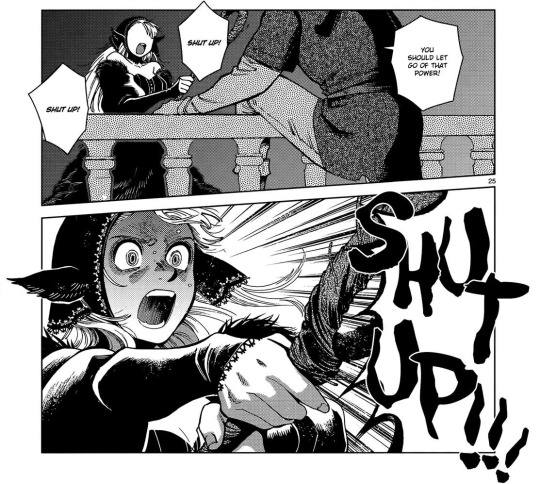
Is this angle character or audience focused? I do think both, because yes these powerful vibes would make her feel confident like I went over and theorized, but definitely a lot relies on an audience level. It’s our official sign, to both us readers and to Laios’ party explaning their reactions lmao, that "oh she’s truly lost it". This is her dark evil wardrobe change. We see her get her goth makeover and we know she’s gone to the dark side. Jojo Siwa moment. (Sorry)
Interlude: fur, luxurious but monstrous
Ok what’s up with all the fur on her skirt and sleeves and the furry ears though. Why a poofy fur dress. We’ve never seen Marcille show interest in fur lined outfits or such before. At most, there’s her trying out the golden kingdom outfit, with its antlers and leopard pelt uhh lointcloths? Which- that is a point to make I suppose lol, gave her a taste of bold high fashion. Her dress is pretty out there as the character reactions hint. Here’s even someone from reddit comparing it to Cardi B’s 2024 met gala dress! If you go back to the earmuffs pages, there’s one ear design with something that looks like fur too. More seriously, fur has long been a way to show class and wealth, because they’re expensive, especially on garments that are meant to be not just practical but pretty.
Quoting @room-surprise : "Costume design wise, the gown just screams class and wealth and power, like as a costumer when I saw it I immediately went 'evil renaissance queen on her way to war'."
But, especially the furry ears, for a manga about monsters that feels quite on the nose right? As revealed by the official dunlord Marcille acrylic stand pictured later in the post, she even has a tail. It definitely represents that her opinion on monsters has shifted imo. Like, it could be just visuals but then that defeats the psychological look into Marcille that the outfit gives us, it could just be a nod to who’s really in control or aesthetics, but I do feel it shows how Marcille has grown less repulsed of monsters. Let’s remember what Marcille said about eating monsters in the barometz chapter, that even if it isn’t logical she has a fear that eating a monster means taking something bad into herself, that it’s dirty and corrupting. Marcille, who takes horror in knowing that fertilizer aka poop has been used to grow vegetables that she then ate. She’s always had a bit of disconnect with ecosystems and the cycle of life so to speak, foiled by Senshi, she wants to defeat death and she doesn’t know how to balance a dungeon because she has trouble tending to ecosystems unlike Falin, she sees them like math when she should see it all as organic living balance. So in the end, it can either show that her mental state is so unstable for her to have been reduced to such a state alongside her barefootness, or on its opposite that she’s accepted the important place of animals and monsters more in the world, that she doesn’t see them as dirty anymore, or even that she likens herself to them. Maybe she’s become a bit of a monster herself, after all, because the dungeon does corrupt, the dungeon devours like how its structure was once compared to a digestive system by Laios, because if the demon isn’t a shepherd and Marcille isn’t a sheep the demon is still who actually has control over everything in the dungeon including the monsters, despite wanting to make believe it’s the dungeon lords who do, because the dungeon lord is a puppet of a demon, just another one of its monsters, its creatures in its guts.
Princess : fantasy

This is it this is the moment. I reworked my post structure after the interview but this was originally going to be the last angle explored after funeral gown instead of before it, this is also the angle that’s most important to my Marcille & Chilchuck analysis. Dungeon Meshi has some fairytale and princess prince royalty knights etc etc imagery and this is a continuation of that in a way, topic for another day though.
As we know Marcille is someone who loves aesthetics, she loves novels and pretty things and idealizing and romanticizing, and this can be seen as the core of the outfit to her. If her situation feels unsettling, it can be fixed by a change in framing, by an aesthetic by an angle by a cool look. Something that inspires and makes the situation feel less alarming, positioning herself as the protagonist rather than the villain. It was given to her by the Winged Lion when she started being more anxious to the battle that is to come, it has the goal to make her more confident but in this context very pointedly the goal to make that self-doubt go away— to keep Marcille from thinking about her situation some more and realizing she may be on the wrong path, it’s to isolate her in her dungeon lord world as part of her role, it’s to keep her in that malleable unstable state and encourage her to chase fantasy and stay in her own bubble of makebelieve. Do you follow me? It’s "don’t think about the stakes, don’t rethink your goals, what you’re doing is right and you should keep going however you want to", it’s "you don’t have to face reality, I’m here and now your dreams are the reality that matters". It’s fantasy.
It’s an epic poofy dress that makes her look cute yet cool. It’s the imagery of a princess in a tower. Calling out to her from beneath a balcony, overseeing her army and her kingdom. A princess dress not unlike the one she felt embarrassed in in the Golden Kingdom, where they talked of prophecies and kings, and wanted to be complimented in, to laughter and dismissal. And even though those things feel more disconcerting in real life than it does in stories then, becoming dungeon lord is good at blurring the lines to the point you can’t tell your doppelgangers of loved ones aren’t the real thing, and the Winged Lion chose her so that has to count for something, she was chosen.
If the princess imagery is left unnoticed by Marcille herself, then I definitely think it was meant for the audience to some degree. If not the poofy dress and heroine status alone, then the tower imagery and the balcony scene. The tower and the princess, the dragon, the knight, the prophecized king, the witch, the monster army, it’s all very reminiscent of fairytales like I mentioned. The balcony thing is a classic play thing though like that is Romeo & Juliette imagery right there, calling out to her from beneath a balcony?!! Aladdin too, Rapunzel, heroes and princes climbing towers to come see and save princesses.
This is the point that is most related to her love of novels and dalclan. Romanticization may be the name of the game for the history behind the shepherdess outfit style, but then fantasy would be the princess’. It’s also about twisting your current situation into something positive despite everything, but Marcille wasn’t that far gone yet, just struggling, framing and aesthetic still subtly help sell it all though. But if there’s something that’d make Marcille feel more confident and ready to do something, hype herself up or give her a twinge of comfort outfit wise, it’d be one that makes her feel like a princess.
Interlude: black, solemn but gloomy
Short one because it’s very straightforward but black is traditionally associated with evil and death, etc etc. Because of the former it’s often associated to powerful malevolent figures like villain sorceresses, but because of the latter irl it’s widely the color of funerals. It’s also cultivated this connotation of elegance, this sleek clean look both in modern and noble contexts, it’s very much this image of cool and ushakeable composure. Interestingly, we can’t 100% tell because mangas are in black and white, but black seems to be Marcille’s mom’s color, what she always dresses in.
Funeral gown
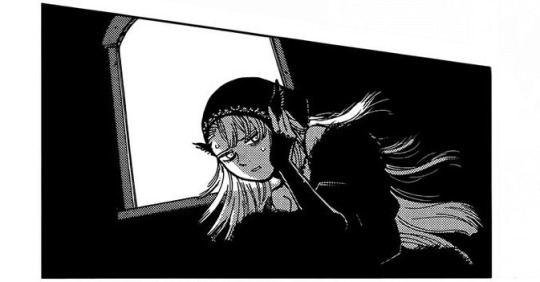
This was the most popular reading by the fandom before the interview and with good reason. As we got the confirmation, it’s nudging towards the intended one! It argued that the dress is a funeral gown, because her mother wore dresses like it and because of its black color, meanwhile the childish earmuffs are because her mourning her father happened when she was a child, because she feels frail etc etc. In her state with her current worries she’s feeling thrown back into her childhood, not unlike Thistle’s weird ambiguity there, feeling helpless just like then except now she has power to change it and a devil on her shoulder telling her all she has to do is affirm herself and take it.
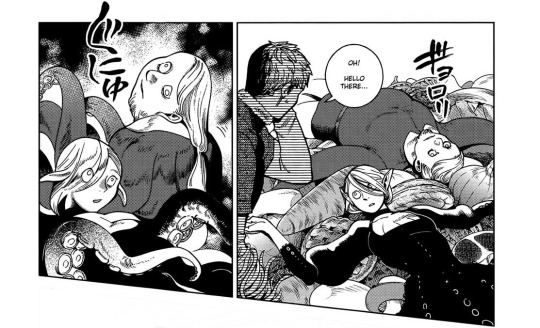
It’s externalizing her trauma and validating it in turn, offering some catharsis and reminding her of her goal, defeating death so she never has to endure loss again.
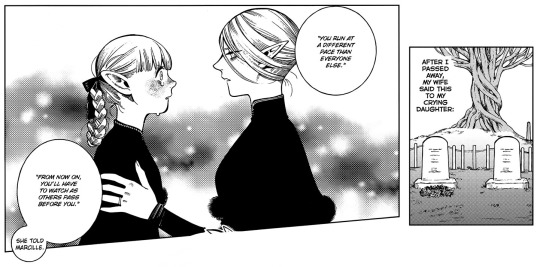
As you may notice, both their outfits here are fur-lined too, so the amplification of that in her dunlord dress may be similar overcompensation to how she made the dress very revealing.
Interlude: barefootedness, filthy but earnest
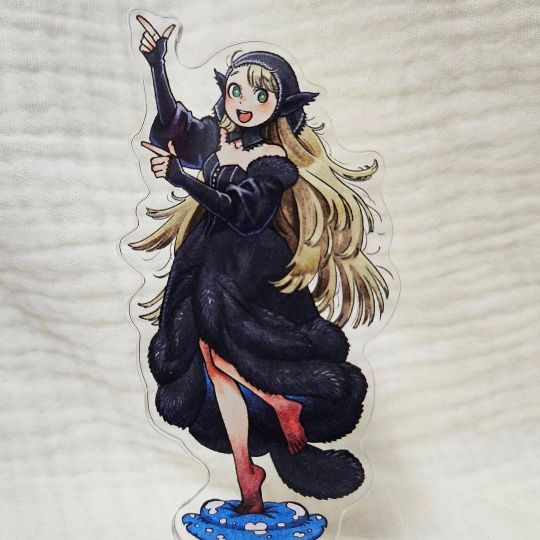
Bloodstained bare feet no less. From what I can tell this is a direct callback to her being barefoot when resurrecting Falin. Again this could be a way of reminding herself of her goal and reminding herself all she’s accomplished, but it’s notable that Falin’s resurrection is something that made her feel very guilty and indecure because of how her becoming a chimera turned out. Maybe more about reminding her of what she has to fix and that she can’t give up on her goals including Falin.
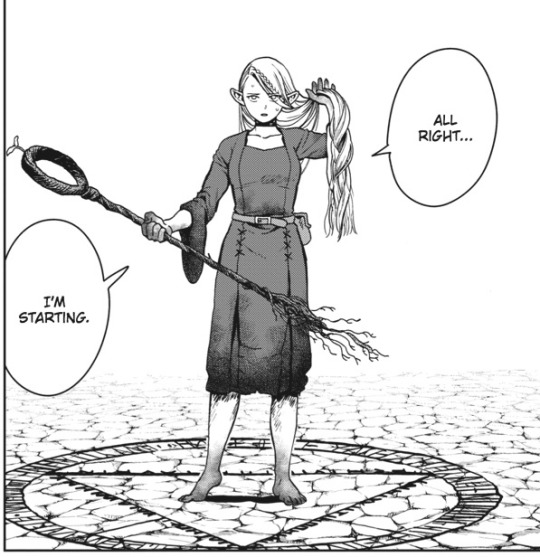
Beyond that it’s interesting too though! Prim and proper Marcille who cares about her appearance and pouts at dirt just walking everywhere barefoot like nothing can hurt or bother her. There’s a sense of her being messy as a dungeon lord, her hair isn’t in an updo and looks unbrushed, she’s in a weird uncharacteristic outfit in a questionable mental state and she’s barefoot on top of it all. It also recalls a sense of vulnerability of course, reminding again an unstable mental state or showing desperation or how naked she might feel. Inversely, it can be more about acceptance, like in the last interlude we talked about knowing your place in the ecosystem and feeling secure in accepting it. Walking barefoot is to bare your skin to the ground, to walk knowing they’ll get dirtied and not minding it. Did you know humus and humilty are from the same word root?
In the end, it gives both ethereal forest fairy vibes and also poor little orphan vibes. Victorian sick child, especially when she gets carried by the winged lion all overwhelmed too haha. Very much gives her out of touch vibes, even if the bloodstained look is powerful. She’s willing to get her feet hands dirty to do what must be done.
Mother : balance
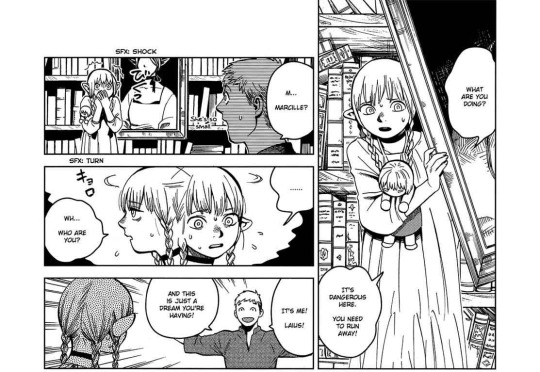
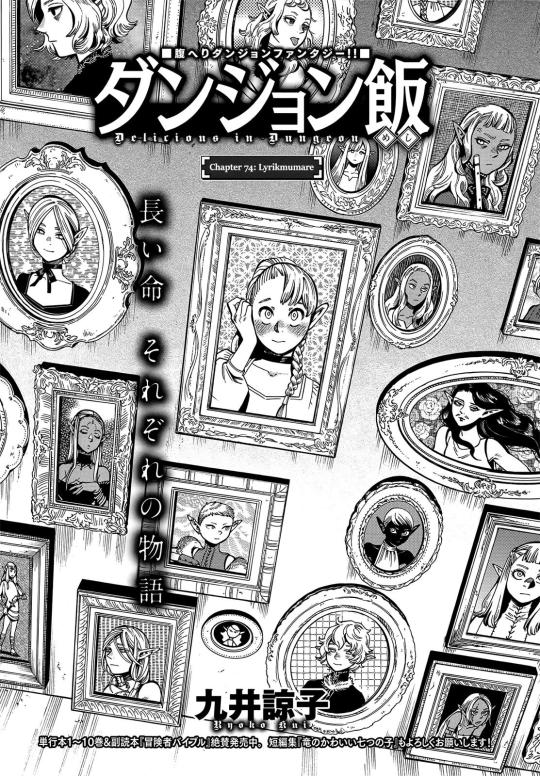
I turned this section into an excerpt post as well, here’s a link, serves as an essier to share highlight + allows me to put in more pictures since we hit the limit here…
Kui: "I just combined [a dress like what] her mother liked and [earmuffs] which are considered a little bit childish."
See what it’s doing here? Kui combined a dress from her mother with a hat for children, adult dress vs childish hat. Adulthood vs childhood. Mother vs child. It’s also notable that the dress is tallman fashion while the earmuffs are elven. Again she’s combining those distinct things into one. It’s about emotions and maturity. Stability and instability. Growing & potential vs having grown & knowing yourself. It’s about her cultures and expectations and how can she possibly keep up with all of them, like the genius child she was portrayed as? It’s duality it’s conflict it’s being pulled in opposite directions. It’s about identity.
Marcille wants to have all the answers and wants them all already, she already acts like she has everything figured out more often than not, when it comes to ways to harvest mandrakes or her image of Falin and Chilchuck and orcs or her rigid sense of ethics, but the story does show that she had growing to do, plus her main goal beyond keeping her friends safe and near her is that pursuit of knowledge for what she doesn’t yet have answers for— rewriting the laws of life and death. But, as we’ve all been told before, death is simply a part of life and we have to make our peace with that one way or another. Like Marcille says in the last chapter, this was in large part the lesson and arc she’s had to go through. A lesson that Marcille’s mother has learned herself, one that she has accepted and tried to pass on to her daughter, which didn’t work and kickstarted Marcille’s pursuit of extending lifespans. Marcille has to settle with uncertainty, with knowing life can end at any moment and knowing this is who she is even if the world has no answers for her as to what that means, she has to come to terms with ambiguity and inbetweens.
Marcille’s relationship with her mother is very interesting because it’s shown all in very small moments and implications, but we do see that Marcille’s mom is arguably her biggest role model. She’s the one who shows up in Marcille’s nightmare about monster food early on, she’s who told Marcille she’ll have to bear loss througout her life due to her lifespan, Marcille wears a choker like she does, it’s debatable that Marcille mimics her demeanor to seem more elven and dignified, in Marcille’s true nightmare she hides behind a portrait of her, she was the only living elven role model Marcille had around. Mother, who didn’t let grief of her husband rule the rest of her life, having even remarried, mother, who’s a court mage, mother, who pursued a life she wanted even if it cost her a lot. And we do know being an elf is important to Marcille! She seeks to conform to elven beauty standards rigidly, both in gender presentation and things like facial hair, and she’s masked as one since she was enrolled in the magic academy, as far as we know her first time away from home and her first big period of social contact since she isolated herself with chickens and books when she was younger. Books like the daltian clan, with an all elven cast except for the one half-elf she deeply related to.
Marcille’s bangs are also half down and half cut. Before she had to cut some hair to make familiars, long bangs were what Marcille wore for years, meanwhile in all of Marcille’s childhood flashbacks including at the magic academy her bangs were always cut short. As we know, hair is important to elves. Her hair is elfness. Her hair is elegance. Her hair is her age. Her bangs are uneven now. It’s part of accepting her precarious weird spot in an inbetween, half up half down haircut. Acceptance on her own aging, that there’s no empiric answer for what Marcille’s equivalent age is in elf or tallman or other, maybe just a ballpark if even that. Answers which are what she’s most desperate to know. What do you mean that student over there has got an astronomic result on her dungeoneum and what do you mean she doesn’t really care for how you did it? Falin who’s thus showing her another way to be, with less self-made pressure, that you can just go with the flow- that you can just… Be.
Her hair being all down and messy as a dungeon lord is part of making the characters and audience understand that Marcille is out of it, but… Like her barefootness there’s some flexibility it implies, for Marcille who’s so rigid on appearance. Accepting her hair to be messy, a sort of shedding of who she is even as she’s overdressed and trying so hard to look like something she doesn’t feel as.
That’s why her outfit makes her feel courageous. Because it makes her feel different from who she is otherwise, because it grants her a look she feels naked without, even with barefeet and messy hair. It’s externalizing how she’s been trying to hold it all together and all her confliction and her feelings and offering some catharsis, no more hiding herself, she’s a half-elf trying to do dark magic. Clean Marcille, clean clean Marcille— Overthinking the dressing, the superficial the aesthetic, without looking enough at the body it’s covering up, the laws of the world the ecosystem of the dungeon the opinions of her friends’— what’s standing right in front of her face, the underlying thing holding up the rest of what she’s trying to change, what’s truly important. She’s back to being like with meeting Falin, overfocusing on the details and the nitpicks and the theorics while oblivious to the slimes and the bats and the balance of mana in that small cave dungeon. She has the dress and the hat but as a whole she doesn’t look like a slay queen or a princess or a cool sorceress or even like her mother, she just looks like a mess.
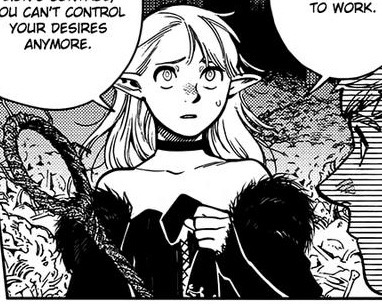
Ultimately after calming down she takes the hat off. She leaves behind the grip that her childhood trauma had on her and moves forward in the dress of adulthood, with maturity and emotional intelligence and logic to deal with her current situation instead of coping mechanisms and desperate grasps for control. And then when the dungeon lord becomes Laios her dress poofs, she’s in her very plain pajamas, plain Marcille, and it’s that Marcille who goes forward to help Laios save the world and defeat the demon. Hence why post-canon she starts dressing in similar dresses to her mother as well, and starts wearing more black. Black here is a color associated with her mother. She keeps her own touch and color here and there, like her red choker instead of a black one, but it’s a stark and sudden difference. She’s matured.
And her friends aren’t afraid to say it like it is and bring back her feet to the ground instead of up in the clouds of fantasy and power where she was, her feet back on the dirt of where they are right now instead of the theorics of "when" and "then" and "forever". She’s weird, she’s unique, in some ways she doesn’t fit in with any group anywhere, and that’s ok and she’s accepted that it doesn’t mean she can’t feel belonging and joy as herself with her flawed friends in a flawed world. After all they did stick with her even after seeing her whole tantrum and embarrassing breakdown makeover. Personally I do say, slay queen.
Her dungeon lord outfit is a coming of age outfit in a very literal way. A bridge between childhood and adulthood. We see her struggle metaphorically between the past and the future, moving on or holding onto trauma. The dress, from her mother, with cleavage and low cut sleeves and a lace gap going down to her stomach and a very short risqué skirt cut, represents maturity but it was very purposefully contrasted with the earmuffs, a childish piece of accessory associated with youth. This shows her mental state, battling with her emotions, wildly fluctuating between her academic put-together powerful self and the childish emotional outbursts the pressure is causing. Time moves on too fast but she’s not growing up fast enough to keep up or make the academic breakthroughs she wants— time is always running out and she’s both too young or too old she’s pulled in both directions and she can never be up to standards. It represents her struggle with her lifespan, her struggle to fit in, to know who she should be and what she should be doing. Considering this, it’s no wonder Marcille is someone who finds ecosystems and the cycle of life unappealing and unintuitive notions, because she has to carve her own space wherever she goes.
Conclusion
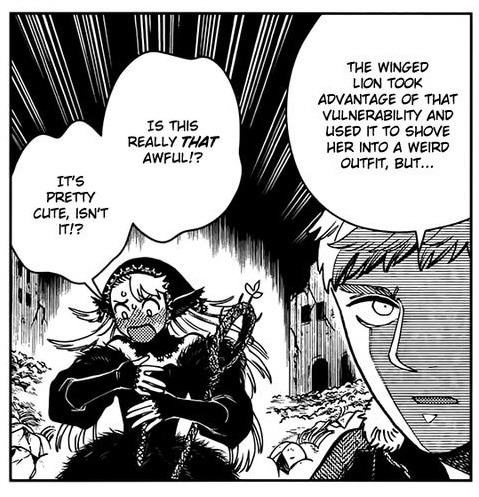
Her friends are laughing because she’s doing one of those over-the-top sexy costumes with a baby bonnet and both of those are extremes uncharacteristic of her and the whiplash of Marcille out of anyone in that weirds them out. They’d take plain old marcille in her pajamas over all-powerful dungeon lord Marcille in an epic revealing goth dress any day. Marcille with messy hair is crossing the line though someone braid it please.
Marcille had a flair for the dramatic, values the grand and the novel-like, big gestures and being swept away by knights. As was discussed in this post of mine and as will be covered in my Marcille & Chil arc analysis, fantasy is something she uses to make the world more digestible, less scary, more handleable. As such, I can totally see how a gown that makes her feel larger than she is, more important or, more narratively, like a protagonist, like a sorceress and a princess, and understood and validated in her mourning, would make her feel like she can tackle things more, better in her own skin, or perhaps, giving into the delusions ever so more. She needs a dose of reality and dw her party (chilchuck) will come to give out that.
Dunmeshi prones the importance of balance for both a healthy body and a healthy mind and hope & fantasy vs logic & reality aka optimist idealism and cynical pessimism are one side of that.
"Fumi, do you really think Kui intended all of this?" To a good degree I wouldn’t be surprised, but ultimately that’s not what matters bc this is still compelling cultural context and themes to read into the text, like I mentioned at the start. Diversity of interpretations is good!! It’s a sign of a deeply rich story! I think in 15 years we’ll still have essays being written on Dungeon Meshi and I think that’s incredible and no small feat.
#I had this post in my wips since december and 2 days after I make the brunt of the shepherdess research Kui’s interview comes out?#My life is a joke#Dungeon meshi#Marcille donato#dunmeshi costuming#Spoilers#Dungeon meshi manga spoilers#Has Fumi reached her maximum level of insanity yet? This may be setting a new bar#Fumi rambles#Marcille lost fey w lamb pelt dress ouuuuuuh#I feel like people use meta to say anything nowadays but THIS is metatextuality this is intratextuality transtextuality etc#Things that make me feel like i’m back in college#Analysis#meta#Marcille’s mother#Alice in wonderland themed analysis of Marcille when. Marcille needing to conform to society and adult expectations#Even in her unusual developmental and multicultural situation when#Alexa play Dead Mom#I need a break sorry if there are typos or unlinked links. Idk what coherence feels like anymore. 9.5k words enjoy#I can just edit in if i remember anything. Right. Right#Sorceress: It feels good to step out of the good girl zone to no longer have to be bound by that!!!#Funeral gown in reverse of the sorceress— it’s about vulnerability and showing it off to the world#venting out all the feelings she’d kept inside and hidden for a long time!!! Things ballooning until its bursting!!!
48 notes
·
View notes
Text
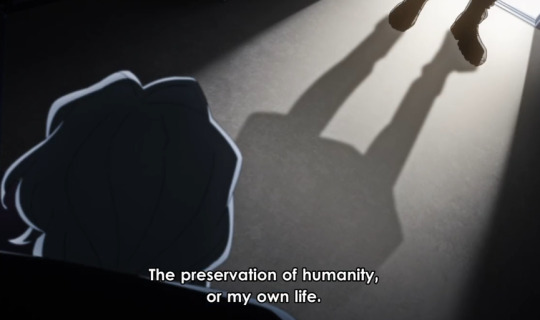
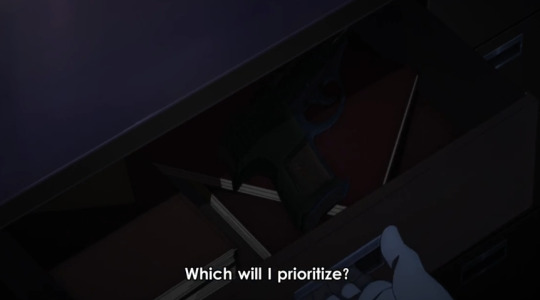
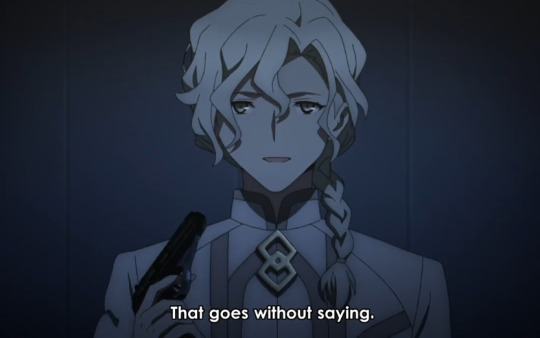
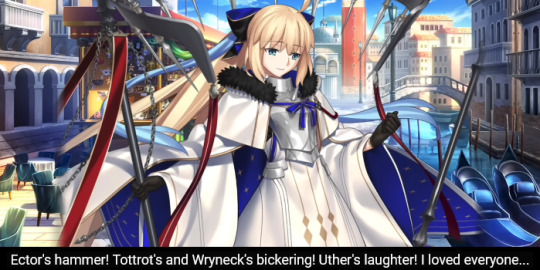
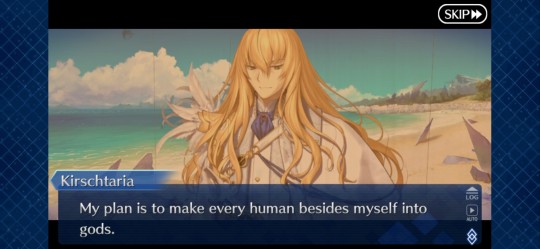
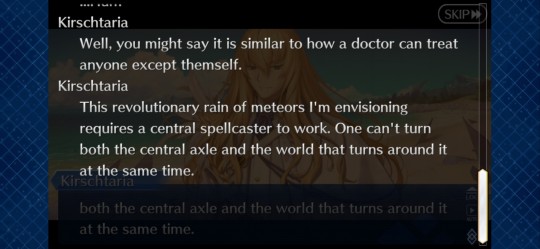
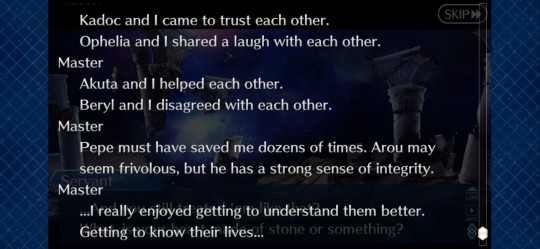
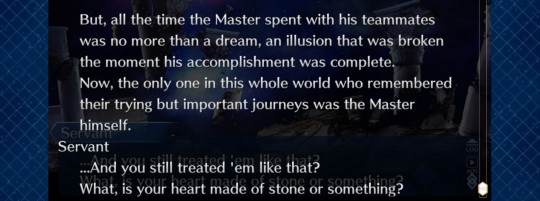
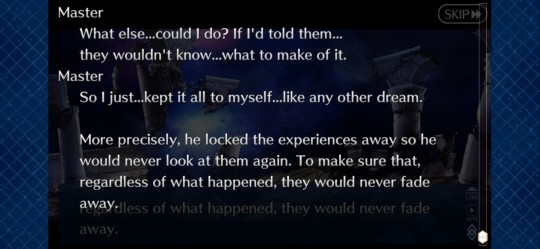
there has been a thematic thread linking marisbury's vision for humanity's future to kirschtaria's own desire to elevate humanity and protect the crypters, and morgan's own effort to protect the land of britain that contains the memories she made as aesc alongside the original tam lin and uther. this also reflects in artoria caster's existence post-avalon le fae as a simulacrum of the actual artoria caster that died in the lostbelt, preserved and embodied by artoria avalon so in some way the memory of that girl who remembered only sadness could be embraced by happiness. additionally, meltryllis in SE.RA.PH. breaching time and space to protect fujimaru is also a link in this chain. morgan's summer form, waking up after her spirit origin manifested her memories of being aesc, makes mention of the butterfly's dream: a philosophical thought musing that there is a transient boundary between dreams and reality.
the chinese philosopher chuang tzu once dreamt he was a butterfly, untethered and free to float in the air. he woke up questioning whether he dreamed he was a butterfly, or whether the butterfly was dreaming it was him. reality can feel like a dream, and a dream can feel more real than anything, underscoring how transience is an unavoidable part of the human condition. people will live their dreams and watch them end from the moment they are born to the day they die, and heroic spirits are the same because humanity lives every day chasing its dreams and heroic spirits are those dreams.
but starting with marisbury, we contend with the idea that sometimes, the dreamer does not wish for the dream to end. if dreams are transient because the dreamer must wake, then the only way to preserve the dream is if the dreamer fades away into the dream instead. marisbury seemingly committed suicide to preserve the animusphere grand order. meltryllis burned through the remnants of her existence to protect her memories of her timeline's fujimaru by saving them in their own. kirschtaria, already at death's door, stayed alive only to ensure his ideal and his friends could survive beyond his death, his soul being described as a bird taking flight with caeneus chasing in tow as he dies. morgan sacrificed being aesc so the land of britain could survive, and wiped her own memories of totorot and mash so they wouldn't be erased from existence for being time paradoxes. artoria caster used her entire life force to forge excalibur so the time she treasured could live on with her friends in chaldea as they fought to save proper human history, and themselves, from the rampage of cernunnos's corpse.
on top of all of that, there have been very cryptic visuals associating mash and butterflies since fgo's first opening. "shikisai" had the visual of a butterfly floating in ruins, and "yakudou" has a shot of mash's gaze following a butterfly flying into the sky. the butterfly is her guide, leading the way to the end of her dream. kinoko nasu himself once shared that cosmos in the lostbelt is a story about accepting that ends will come, and thus the butterfly is the lesson that she must take to heart to grow into a person who can claim what the purpose she chose is without shame or hesitation as the end draws near. this is something she did once saving fujimaru from goetia's ars almadel salomonis at the end of observer in timeless temple. and i would not be surprised if she did the same against marisbury at the end of cosmos in the lostbelt (which has yet to finish, as paper moon's trailer demonstrates having it be part of the chapter's title).
but what is the dream she is dreaming that is inevitably coming to an end that she will choose to protect at the cost of her place in it? if you've been reading this far, then the answer should be obvious.
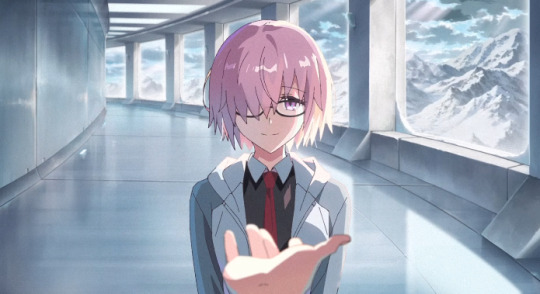
but nasu wouldn't be much of a romantic if he believed an end is all you could really look forward to. the journey is far more important than the destination, because it's the only thing that can give the end meaning, as romani archaman rightly puts in his final conversation with mash. you can only extrapolate the significance of something after it's already over. not at the start, not in the middle of it, and not at when it's over, but at the moment that lies beyond the end of the dream.
and when a dream ends, that is the moment when another begins.
298 notes
·
View notes
Note
What do you think about kokichis hat / whole design controversy ? You seem like a dangan expert so i want to know your 2 cents
So, this is going to be a bit of a history lesson.
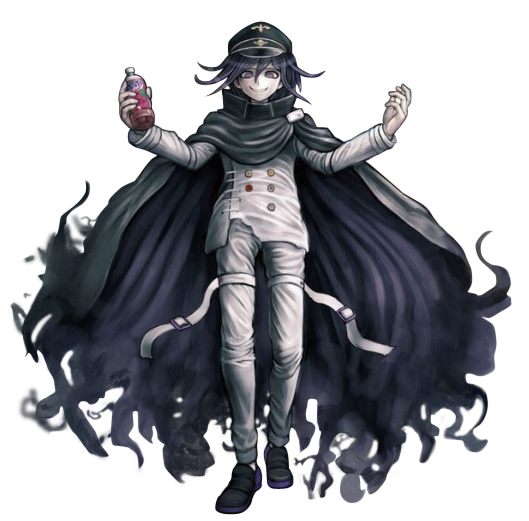
Kokichi is very obviously supposed to be a Nazi reference. That's pretty undeniable. From the SS Officer Visor to the Grape Fanta parody (Fanta having been created by Nazi Germany) it is very much an intentional reference.
This is where culture shock comes into play.
Please note as you read I am not attempting to make a statement on if this is "okay" or "bad" - I am simply presenting the facts of the matter.
As you can imagine, WWII is taught differently depending on where you're from. America, Germany, Italy, Japan, etc. A country will typically focus on its own perspective of events. This not only influences the narrative, but what parts of history are most focused on. For example, in Germany, it is often cited that they focus very heavily on Nazism and Hitler, and reinforce the tragedies they were responsible for. American schools will focus on a more general overview, with a lesson maybe on the atomic bombings they committed (and condemning their actions).
So for Japan, it's obviously different, too.
You can read some personal accounts on threads like this one and this one. But it mostly boils down to this: because a country will mostly focus on their own personal experience when teaching about a historical event, in this case, Nazism is not covered nearly as much in a Japanese curriculum as it would be in an American or German one.
This article from 2015, titled "What is the Nazi Chic Fashion and why is it spreading in Asia?" has a good excerpt, which I'll translate (the article is in Japanese):
しかし、Kidd氏が、欧米のマーケットよりも遥かにナチ・シックが急速に広がっている、と話すアジアのファッション・マーケットで��、ナチのシンボルが繰り返し使われている背景にあるものは異なる。ヒトラーと結び付いた文化的ハードルは低く、かぎ十字を身につけてもショックは本質的に大きくない。
However, according to Kidd, "Nazi Chic" is spreading much, much more rapidly in the Asian fashion market compared to the Western fashion market. However, the context behind the repeated usage of Nazi symbols is different to that of the Western market. The cultural hurdles of wearing something associated with Hitler are much lower, and not intrinsically all that shocking.
This is evident in many pieces of media meant for children or teens. Please think to yourself if you've encountered a piece of Western media made for children or young teens that depicts Nazism or Hitler in a comedic or stylish fashion. Personally, I cannot think of any.
But that is not the same in Japan. For example, the 1995 movie Dragon Ball Z: Fusion Reborn has a scene where the characters Goten and Trunks fight a caricature of Hitler.

Or Ouran High School Host Club, a 2002-2010 manga and 2006 anime, had not just a gag in the anime depicting an all-girl school as Nazis, but a piece of art drawn by the Mangaka herself of the main characters wearing Nazi Chic fashion.


Of course, this is not to say Japan is a-okay with Nazi imagery as a whole. Like any country, citizens have their own views and opinions. There are plenty of Japanese citizens who do not think this type of fashion style is okay. Much like how in America, there are people who think humorous depictions of Hitler are fine. I am just bringing these up to say, from a cultural standpoint, this subject is handled slightly differently.
That takes us back to Kokichi. Kokichi is definitely supposed to be reference to Nazi Germany. But I think it's much clearer now that it's not intended to be malicious. Making jokes or fashion statements out of this is more socially acceptable relative to the west. You still have the right to find it uncomfortable or not okay if it personally bothers you, but I am just explaining why this came to be, why it is not intended to be malicious, and why it was allowed.
I hope you find it informative. :]
33 notes
·
View notes
Text
<Ten Ways to Create a Great Female Protagonist (Without Falling Into the Usual Modern Traps)>
Good female protagonists matter because we remember them differently. They haunt. They heal. They hold mirrors we don’t always want to face. But far too often, they’re written as accessories—or ideals and fantasies.
Let’s stop that. Let's break the cliche one step at a time. This isn’t about “strong female characters.” It’s about building a girl who breathes on the page when you write.
1. Give her contradictions.
The best female characters aren’t consistent—they’re complicated. She can be brutal one day and gentle the next. Quiet in public but dangerous alone. People aren’t cohesive, especially after trauma. Contradiction isn’t a flaw—it’s a fingerprint.
Don’t sand her edges. Let her be jagged. Let her be real.
2. Let her be ugly. Not visually—emotionally.
We’re so obsessed with likability that we forget to let women unravel. Let her make mistakes. Let her lash out. Let her fail. She’s allowed to be petty, jealous, cold, obsessive. Healing isn’t a straight line—and women don’t exist to teach moral lessons.
You want honesty? Then let her bleed wrong sometimes.
3. Make her want something.
She needs more than just “get out alive with plot armor.” What keeps her up at night? What would she risk her name for?
Desire is the engine of every character. Even if she doesn’t say it out loud—you should know.
A girl without hunger is a ghost in your story. Let her want wildly. Let her want too much.
4. Avoid “female character” energy.
If you start with “what should a female lead be like?”—you’re looking at it wrong.
Write a person. Build her like you would any compelling character. Give her history, motive, flaws, rhythm, refusal. Then when you sit back and look at her, you realize something—she’s just a girl.
Write her like a storm. Then name her afterward. Prioritize later.
5. Do not make her the “exception.”
She doesn’t have to be the only girl who can fight battles. Women exist in community. In sisterhood. In memory. Let her be part of a lineage, even if it’s fractured. Let her stand beside others. Not above them.
You’re not just proving she’s “not like other girls.” You’re proving you don’t know anyone like her. You're giving a part of yourself to her creatively. You're giving her your voice.
6. Her trauma isn’t her personality.
It can shape her. But it can’t swallow her. Trauma is a ghost in the room—not the only thing she talks about. Give her humor. Give her obsessions. Let her say weird things when she’s tired.
Women are not metaphors for pain done to others. Let her laugh before she heals. Let her grieve after she turns her back to the camera.
7. Don’t make her perfect to protect her.
There’s this instinct—especially from male writers—to make female characters untouchable. Always right. Always justified. Always noble. But perfect isn’t safe—it’s invisible. Let her fumble. Let her contradict herself. Let her say sorry too late.
If she’s allowed to be wrong, she’s allowed to be real. Because she's human. This is the mark of every great relationship—and that comes with experience.
8. Give her silence.
The most powerful girls I’ve ever written don’t explain themselves. They don’t always narrate. They observe. They calculate. They’re loud in posture. In the way they close a door. Some girls speak with just their absence.
Not every voice needs volume. Some need space to destroy. Some need time to do it.
9. Let her be loved—but don’t make that her arc.
Love doesn’t complete her. It reframes her. Let the relationship be one thread in the story—not the whole fabric. Because her identity existed before the boy. And it’ll still be there if he leaves.
Romance is powerful. But returning to herself is more sacred. Her character arc will cause her to love harder anyway. So make them earn it. You have to trust her.
10. Write her like she’s your favorite character.
Because if she’s not? If she’s a symbol. A vessel. A checkbox. It will show. The best female characters are written with obsession. Reverence. Intimacy. Not to impress viewers or readers, but because you believe she’s worth remembering.
If she’s unforgettable to you—she will be to us.
11. (Bonus) Write what’s missing.
This is my specialty. And in this day and age, there's a lot to be desired.
Build upon the mistakes of others. Make the girl no one else thought to write. The kind who doesn’t fit the mold—because she remakes it.
If the stories you needed growing up still don't exist, build them from memory. From silence. From rain. From fire.
She doesn’t have to look like anyone else.
She just has to feel true.
---
Don’t just write women. See them. Meet them. But not as symbols. Not as saviors. As stories with blood in them.
And if she walks off the page—let her. That’s when you know she’s real.
It's okay to be original. It's okay to be yourself. It's not fiction. It's confession.
#writing#writing tips#writing advice#character design#women in fiction#female main character#female protagonist#storyteller
9 notes
·
View notes
Text
More Info abt Merman Lupin AU
I'm not posting anything for day 5 of lupin week (prepping for next drawings + i have no idea what to draw for it) so i'll post some extra stuff about my au!
Character Sheet:
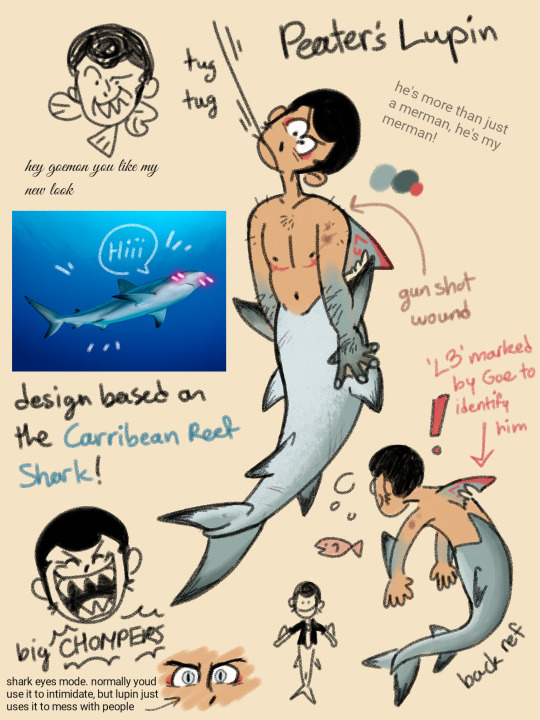
before, i didn't really have a specific species of shark to model him off of, so i did like a 3 minute research on google and landed on the carribean reef shark! it's mainly cuz they're one of the friendliest sharks.
yeah, merman lupin's a bit of a cutie in this au. mostly cuz he does not know any life of crime. he doesn't have a reason to hurt anybody. don't imagine him as some sort of 'innocent cinnamon roll' though. he's still lupin after all.
the gun shot wound is there because of his interaction with zenigata as mentioned before in my prev thread.
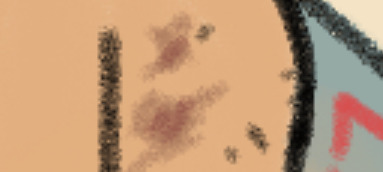
like the og lupin, he really doesn't understand when to stop getting into dangerous situations. he only sees humans as funny creatures to watch. sometimes, he even tries to scare people by putting on makeup and covering himself up with bones and kelp. he's built up a reputation for himself as some sort of sea monster around the east coast of japan because of his tomfoolery.
other than messing with humans, his other hobby is collecting cool shiny stuff and racking up a huge collection that he keeps all in a cave somewhere in the pacific. he doesn't just collect jewels, but other human nitnacks from machines to forks. he even knows how to use them! he's a smart fella
---
that's most of what i have for his personality. now for a little history lesson.
i made this au back in june 2022, you can tell cuz my art style looks a bit strange. fujiko was intended to be the second person he meets instead of goemon.
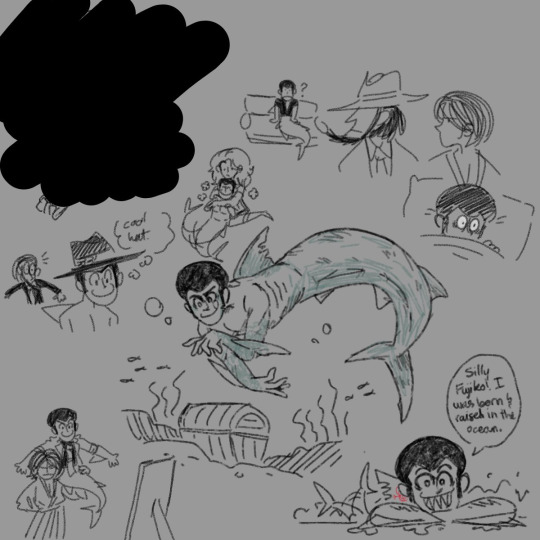
i decided against fujiko because they might not get along sometimes given their complicated dynamic in the manga, plus goemon makes sense to be one doing shit in the middle of the ocean.
lupin was able to go in land without any consequences, now he dies if he stays for too long. (it's due to the crystal's power not being powerful enough to keep him alive if he strays too far from where he died
old merman lupin also had gills! i realized after that it's too complicated of a choice given how sharks have to move all the time to keep breathing, so now he functions like a sea mammal.
and yeah that's all thanks for reading up to this point, im really grateful for the praise i got for this au. it genuinely made me so happy!! i would've never expect this much people to like my au...
maybe ill do more of this in the future.
#lupin iii#lupin the third#lupin iii manga#peaterookie art#shin lupin iii#jigen daisuke#goemon ishikawa xiii#fujiko mine#merman lupin#peater oc
82 notes
·
View notes
Text

Tuesday, January 7, 2025
I am so happy to have piano lessons started again! I don't know whether you have noticed or not, but playing the piano is relaxing for me, hence why I practice so much. I'll never play as well as Julien, he's a natural while I have to work at it more, but as long as I enjoy playing, I will keep doing so.
Ballet starts officially on Wednesday, but we had a winter warm-up class tonight for the advanced levels. There was one yesterday too, but I only registered for this one. It's always nice seeing my dance friends and sharing class with younger as well as more advanced students.
I really should get an extra hour of piano in tonight, but I also want to catch up on my gaming, since I'm not too sure when I'll be able to get back on. Possibly on Saturday. My sub will be out soon, and I'm not sure if I'll renew it at this point. I have a lot going on, and I won't be able to play as much as I would like to for the cost of the sub. My guild already knows that I will probably take a break until I'm done with schoolwork in May. I will be even more behind than I already am at that point. It's okay. My studies and extracurriculars are more important to me right now, and I can still chat with the guild on our Discord server since that's also where we are doing our group Bible study together. I'm excited about it! It's the whole Bible in one year and in chronological order of events. It will be fascinating!
Tasks Completed:
Algebra 2 - Reviewed exponent rules + learned about natural base e + learned to simplify natural base expressions + learned to evaluate natural base expressions
American Literature - Copied vocabulary terms + read about the affluent but alienated 1950's + read about Arthur Miller + read about Death of a Salesman by Arthur Miller + read about themes and symbols in the play + watched a summary of Miller's play The Crucible + read about McCarthyism + read about organizing a strong argument
Spanish 3 - Reviewed colors vocabulary + listened to a commercial in Spanish + wrote three sentences in Spanish that described what I was wearing
Bible 2 - Read 2 Chronicles 30
Early American History - Read about the election of Madison + read a biography on James Madison + read about the Star-Spangled Banner (song + flag) + answered questions on the reading
Earth Science with Lab - Watched a short documentary about the Earth, Moons, and stars
Art Appreciation - Read "What is art?" + read about aesthetic perception + read "Perceiving Subtle Qualities" + completed activity + found a painting that used the same hue and copied the name/artist down for reference
Khan Academy - Completed Algebra 2 Unit 8: Lesson 2
Duolingo - Studied for approximately 15 minutes (Spanish + French + Chinese) + completed daily quests
Piano - Piano lesson + practiced for two hours
Reading - Read pages 3-37 of Threads That Bind by Kika Hatzopoulou
Chores - Laundry
Activities of the Day:
Personal Bible Study (1 Timothy 6)
Group Bible Study + Devotional (Job 14-16) + Weekly Discussion
Ballet Winter Warm-Up Class (1.5 hours)
1 hour gaming
1 episode of Forest of Piano on Netflix
Journal/Mindfulness
#study blog#study inspiration#study motivation#studyblr#studyblr community#study community#study-with-aura
15 notes
·
View notes
Note
Feeling very ironwidow starved, feel free to ignore but would you write a drabble on maybe Tony and Nat waking up to each other in the morning? Domestic, Fluff, I will take anything 😩🤞🏻
dude i feel you i've been in my feels about them today too! okay, super short, but have a small extended/alternate scene from endgame the morning of the day natasha figures out there were 3 stones in nyc in 2012.
-
Tony wakes with the irritating feeling of a textbook digging into his spleen.
His eyes blink open slowly, not a little surprised that he even fell asleep. He's always been a light sleeper, even in a king bed with six-hundred thread count sheets, but his brain has been overactive the past few days as they've attempted to make a plan to time travel. Or maybe he's just gone soft, used to hanging with Morgan in the cabin on alternating weeks with frequent visits from his fiance.
Speaking of his fiance...
With a groan, he shifts from his side to his back, tilting his head until he sees Natasha's stomach, gently rising with each inhale and exhale. They're laying head to foot, necessitated by the stacks of books and hardware and assorted snacks. Beyond her, he sees Bruce on the floor, snoring loudly. Wow. Really surprising he was able to sleep.
He props himself up on his elbow, always soothed by the familiar sight of Natasha's sleeping face. But when he gets high enough to look at her closed eyes, he realizes that they're open.
"Honey?" He tries. She merely blinks; he knows that she knows that he's awake. "Nat, our relationship's at least thirty years from your hearing going," he teases, trying to hide his underlying worry.
She sighs, turning her bright green eyes on him. They curve awkwardly toward each other, almost in a lopsided huddle. "Are we doing the right thing?" She murmurs, her voice laden with doubt that she will never show the others. "What if the consequences are worse than the world we're living in? What if we lose Morgan?"
Despite Tony's own corresponding fears, his heart warms at her personal acknowledgement of Morgan. His little girl loves her so much; the divorce could have been catastrophic, but Pepper and he are in a good place, and now Morgan has three parents. He never planned for his daughter to be able to escape handcuffs, trunks, and pilot a helicopter, but he can't deny that it eases his mind every time Natasha teaches Morgan another life skill when Pepper's and his first instinct had been to shield her from the world. Pepper even frequently takes part in lessons after Natasha had stressed the world's instability.
He snaps back to attention when Natasha tucks her messy hair behind her ear. He studies her watery eyes and deep, dark circles and well-bitten lips. She looks exhausted. He bets he looks the same.
"I remember when Barton came to stay with us," he says instead of answering. Natasha doesn't seem to mind. She just watches him, hanging on his every word like they'll damn or absolve her. He truly believes that if he told her they had to leave now, she would go. It's terrifying, the power they have over each other. "He said that when you talked after Loki escaped, all those years ago, he didn't think you sounded like you."
Natasha mouth twitches into a smile, reminiscing. "He told me I wasn't a soldier," she remembers. "That we weren't the kind of people to wade into a war."
"But then, with hindsight, he changed his mind," Tony replies. "And you were right to wade into that war. It was hard, harder than anything, and though you know I'd be the first to fight with our teammates about goals and ethics, you were still right to fight." He takes a deep breath. "You were right then, and you are right now."
Natasha isn't crying or carrying on, but he can tell from the struck look in her eyes that what he's said has touched something deep inside her. "I love you," she says, the emotion and history between them clear in every word.
"You mean everything to me," he says, low and earnest. Shockingly, he feels no desire to reach around the space between them, to hold her kiss her. Instead, they just look at each other across their curled bodies, keeping the bubble of air between them just for them. The sun rises in the window behind Tony's back. He feels the heat on his skin, but he's truly kept warm by the light in Natasha's eyes.
They lay there until Bruce wakes up with a hiccuped snore. They lay there until they're ready to take on any threat that comes their way, even if that threat is time itself.
#hope you liked it!#ironwidow#marvel#my writing#you definitely caught me in a good moment lol i never answer prompts#right when i get them#tonynat#marvel writing#answered#anonymous
20 notes
·
View notes
Note
Hi ;-)
How about another Hazbin Parent Request? ^^ Reader male in his Teens has a bit of over the top spoiled Student Behavior like i am the son of chara xy you dont tell me anything old teacher - and it backfires, Parent has to go with the Teen to a serious Principal School talk Situation? Would love to read Vox, Zestial, Missi Zilla and Carmilla (can imagine she would take sides with the principal like thats what you get kiddo ^^) - maybe or any character you feel comfy writing for this Request ;-)


╭﹒⊹⋆﹒ @ 𝖈𝖍𝖗𝖔𝖓𝖔𝖌𝖍𝖔𝖚𝖑 2024.
୨ ,, hh parents dealing w spoiled son reader .ᐟ
𖦹 。° note : jalice ilysm ty for requesting AGAIN 😭 like you're genuinely so supportive and ur comments are always so nice to read like ty 💙, I hope I didn't disappoint you!! Zestial and missi zilla are so hard for me to write like 😨😖😣, I'm sorry if I got their personalities wrong or anything, also don't even ask how I managed to write so fast I don't even know 😭 𖥔 ݁ ˖.°. ⭑
﹒。ꔫ﹒wc : ~1.1k
𝐜𝐨𝐧𝐬𝐢𝐝𝐞𝐫 𝐫𝐞𝐛𝐥𝐨𝐠𝐠𝐢𝐧𝐠 𝐭𝐨 𝐬𝐡𝐨𝐰 𝐬𝐮𝐩𝐩𝐨𝐫𝐭

Vox
The principal’s office buzzed with an artificial hum, fluorescent lights glaring down like a spotlight. Vox lounged in the chair across from the principal, his sharp, angular grin unwavering. He was dressed to kill as usual—sleek suit, an array of gadgets flickering along his sleeves, and sunglasses pushed down just enough to reveal piercing red eyes.
“Let me get this straight,” Vox drawled, his voice like static wrapped in velvet. He adjusted his cufflinks lazily. “You’re telling me my kid—my kid—was disrespectful to your... what was it? Eighty-year-old, washed-up history teacher?” He turned his head, aiming a smirk at you. “Kiddo, you could’ve at least tried to make it interesting.”
You slouched deeper into the chair, cheeks hot. “It’s not my fault she couldn’t keep up,” you muttered. “I’m the son of Vox, for Hell’s sake. Why do I have to listen to someone who probably fought dinosaurs?”
The principal—a middle-aged demon with a poorly tailored suit and a constant twitch in his left eye—cleared his throat. “This isn’t about her age. It’s about respect. If this behavior continues—”
“Blah, blah,” Vox interrupted, spinning a finger in the air. “Kid mouths off, teacher cries, you call me in. Am I supposed to... what? Ground him? Send him to his room? Let’s be honest, Principal—I’m not the discipline type.” His grin widened, a flicker of blue electricity zipping through his fingers. “But if you really wanna teach him a lesson, I could give the school a makeover. Turn your little detention hall into a VR nightmare zone. Bet that’ll straighten him out.”
You flinched. “Dad, come on—”
The principal went pale, beads of sweat forming on his forehead. “That’s—uh—not necessary, Mr. Vox.”
Vox’s laughter echoed like static in a dead channel. “Relax, big guy. I’m kidding. Mostly. But seriously, kiddo...” He leaned forward, his tone dropping to something dark and electric. “Next time, make it worth my time. Embarrassing me like this is so last season.”
Zestial
Zestial strode into the office like he owned the place, which wasn’t far from the truth. His tailored suit gleamed with threads of gold and crimson, and his trademark cane—adorned with a jeweled serpent head—tapped against the tile floor with a rhythmic click-clack. He didn’t sit; no, Zestial preferred to loom, his lime green eyes flickering like molten lava as he glanced between the principal and you.
“My son,” he began, his voice as smooth as a snake’s hiss, “has informed me this meeting was a waste of my precious time. Do enlighten me, Principal, as to why I should care.”
The principal adjusted his tie nervously. “Well, Mr. Zestial, your son—uh—has been disruptive in class. Today he told his teacher, and I quote, ‘I am the son of Zestial. You’re lucky I don’t have you replaced with someone who can actually teach.’”
Zestial tilted his head, his lips curling into a faint smile. “Oh, did he now?” His gaze shifted to you, and the smile grew sharper, deadlier. “Is that what you said, darling?”
You gulped, trying to keep your cool. “I mean, it’s not technically untrue. I’m just saying, if she can’t—”
“Silence,” Zestial commanded, the single word freezing the air. “You’ve embarrassed me.”
Your heart dropped. “Dad, I—”
“Embarrassment,” he continued, stepping closer, “is not tolerated in this family. If you wish to wield my name, you will do so with grace and purpose, not as a shield for your mediocrity.” He turned back to the principal, bowing his head slightly. “Rest assured, this will not happen again.”
The principal exhaled in relief. “Thank you, Mr. Zestial.”
As you both left the office, Zestial leaned down, his voice a low whisper. “We’ll discuss this further at home. Pray you survive the lesson.”
Missi Zilla
“Let’s get one thing straight, Principal What’s-Your-Face,” Missi said, leaning back in her chair and tossing her long, scarlet hair over one shoulder. Her fangs glinted as she grinned, her tail swishing lazily against the floor. “My kid’s got guts, and I like that. So, what’s the problem?”
The principal rubbed his temples. “Mrs. Zilla, your son—”
“Miss Zilla,” she corrected sharply, her grin fading. “Don’t make me repeat myself.”
“Uh, Miss Zilla,” he stammered, “your son has been disruptive in class. He’s been using your reputation as an excuse to undermine authority.”
Missi snorted, throwing her head back in a sharp laugh. “Oh, honey, you’re preaching to the choir. I taught him that. The world’s full of losers trying to drag you down. You gotta remind them who’s boss.” She turned to you, her amber eyes glinting. “But come on, kiddo. You gotta know when to tone it down. Save the power plays for people who matter.”
You squirmed. “I didn’t think it’d be a big deal.”
Missi rolled her eyes. “Yeah, well, now we’re stuck here with this guy's lecturing us.” She gestured lazily at the principal. “You owe me ice cream for this.”
The principal sputtered. “Miss Zilla, with all due respect—”
“Relax, Principal.” Missi leaned forward, her grin returning. “I’ll have a chat with him. But don’t think you’re off the hook, kid. Embarrass me again, and I’ll make you clean my tail spikes.”
Carmilla
Carmilla swept into the room like a storm cloud, her flowing black dress trailing behind her. Her eyes, sharp and predatory, locked onto the principal before flicking to you. She folded her arms, her expression a mix of disappointment and amusement.
“So,” she began, her voice dripping with condescension, “my darling boy has been causing trouble. Color me shocked.”
You shifted uncomfortably. “It’s not that bad—”
“Oh, hush,” she snapped, waving a hand dismissively. “You wanted to act superior? This is the price you pay. Honestly, I’m embarrassed for you.”
The principal nodded. “Thank you, Mrs. Carmilla. Your support—”
She turned on him, her lips curling into a smirk. “Oh, don’t thank me. This is your problem as much as his. If your teachers weren’t so dreadfully uninspiring, perhaps my son wouldn’t feel the need to assert himself.”
The principal’s jaw dropped. “Mrs. Carmilla, that’s not—”
“But,” she continued, cutting him off, “I will handle this. He needs to learn humility, and I am more than capable of teaching it.” She leaned down to meet your eyes, her tone venomous. “Enjoy your free time tonight, darling. It will be the last you have for weeks.”
You swallowed hard. “Y-yes, Mom.”
Carmilla straightened, addressing the principal with a cold smile. “Consider this resolved. Good day.” And with that, she swept out, leaving you to trail behind her, dreading the lecture that awaited.

#୨୧┇𝐖𝐫𝐢𝐭𝐢𝐧𝐠#୨୧┇𝐂𝐡𝐫𝐨𝐧𝐨𝐠𝐡𝐨𝐮𝐥#writing#one shot#oneshot#hazbin hotel#zestial#carmila carmine#carmilla#missi zilla#vox the tv demon#hazbin vox#hazbin hotel vox
10 notes
·
View notes
Text
I forgot to screenshot it but I saw a Reddit thread about a teacher not being able to get her middle school class take 9/11 seriously and the comments were a mix of rational people saying they weren’t alive for it so it’s just another history lesson to them, talking about how it’s insane to hammer the event in on the day every single year to just make them feel bad for no reason, talking about how the event has become inseparable from blind nationalism and jingoism and of course the protracted ‘war on terror’ that has a human cost exponentially greater than 9/11 etc. But then some of the comments were absolutely deranged. Like one person was “I play the calls from the towers documentary because it takes a sociopath to laugh at that” like these are 12 year olds and you’re making them listen to phone call audios from people who are trapped and about to die in the next moments and are unable to do anything about it??? And someone replied saying that was crazy and they responded saying it was no different than teaching about the holocaust. Girl
I actually remember I think in one of my grade school classes one year they did indeed make us listen to those audios. Like genuinely kinda traumatizing and for what !!!!! This country is so insane
66 notes
·
View notes